Donation Report







Through times of hardship and times of prosperity, the Shakopee Mdewakanton Sioux Community (SMSC) has honored the Dakota tradition of helping others by donating time, money, and other resources each year to a variety of worthy causes. This tradition of giving is part of who we are as Mdewakanton Dakota people, and we are fortunate to be among the top charitable givers in Minnesota and Indian Country as a whole.
Over the last 26 years, our tribe has given more than $350 million to Native American and non-Native American organizations, nonprofits, health care facilities, and local governments—both in our home state of Minnesota and across the country. The SMSC’s commitment to giving would not be possible without the full-fledged support of our tribal members, and we would like to extend our sincere gratitude for their unwavering dedication to helping others—now and for generations to come.
Each donation carries with it a story, and we are proud to share those stories in the pages that follow. While this report only contains a glance at the many worthy causes the SMSC has supported, we are honored to highlight some of the remarkable organizations, nonprofits, and other donation recipients from the past three years, along with the meaningful endeavors they pursue. These groups are making impactful, life-changing differences in their communities and beyond. We are inspired and humbled by their work, and we hope that the stories within this donation report will inspire you as well.
Pidauŋyaŋpi (We are thankful).
SMSC Chairman Keith B. Anderson
SMSC Vice-Chairman Cole W. Miller
SMSC Secretary/Treasurer Rebecca Crooks-Stratton
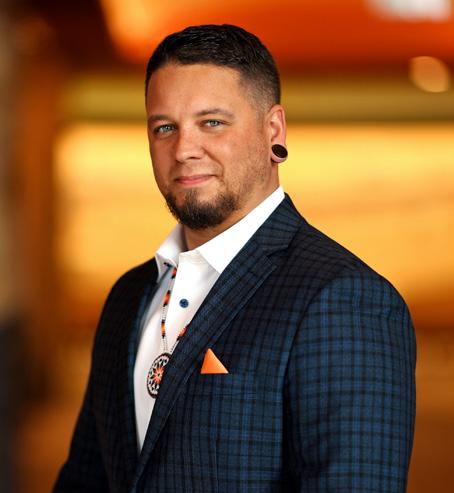
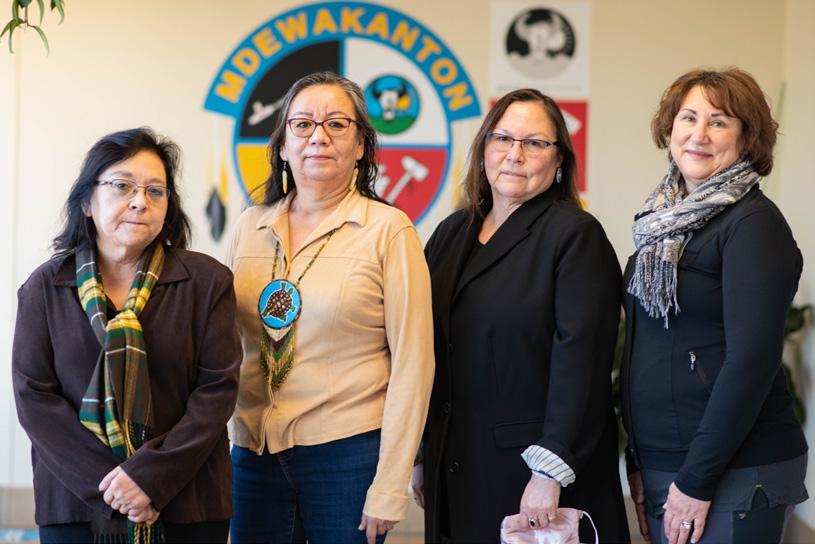
To help guide the SMSC’s charitable giving efforts, several Community Members dedicate their time and commitment to the Dakota tradition of wóokiya—generosity and helping—through the Sharing Resources Work Group. These entrusted members gather monthly to review thousands of donation requests and provide recommendations to the SMSC Business Council, ensuring the selected recipients align with the tribe’s values and priorities.
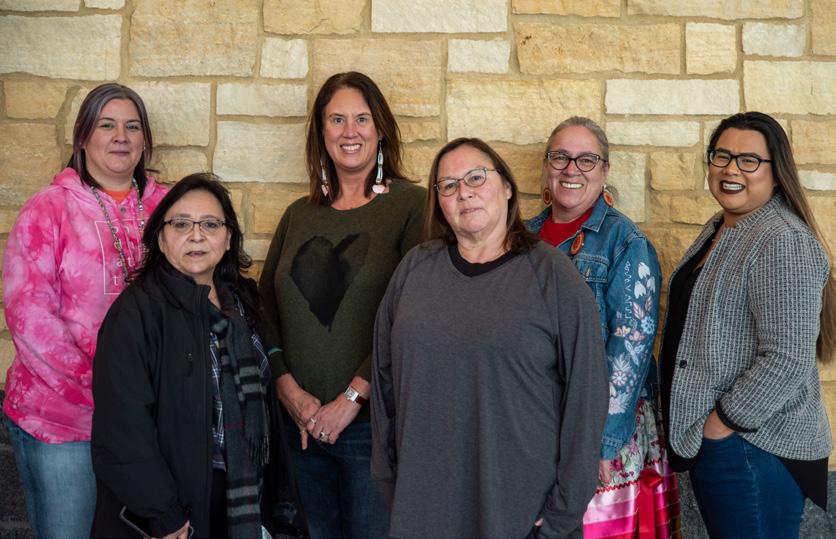
The Sharing Resources Work Group plays a pivotal role in the SMSC’s goal of planning for the next seven generations—while also fulfilling the tribe’s mission of being a good neighbor, good employer, and good steward of the earth.
“Haŋ Mitakuyepi. Hello, my relatives. I want to thank all of you who have submitted charitable giving requests over the last three fiscal years. It’s not always easy to make these decisions, but it is an honor to be a part of supporting so many great projects. We hope that together, we can support one another to create better communities. Pidamayaye. Thank you.”
–ALLENE ROSS, SMSC SHARING RESOURCES WORK GROUP LEADERFor more information about charitable giving and donation requests, please visit SHAKOPEEDAKOTA.ORG
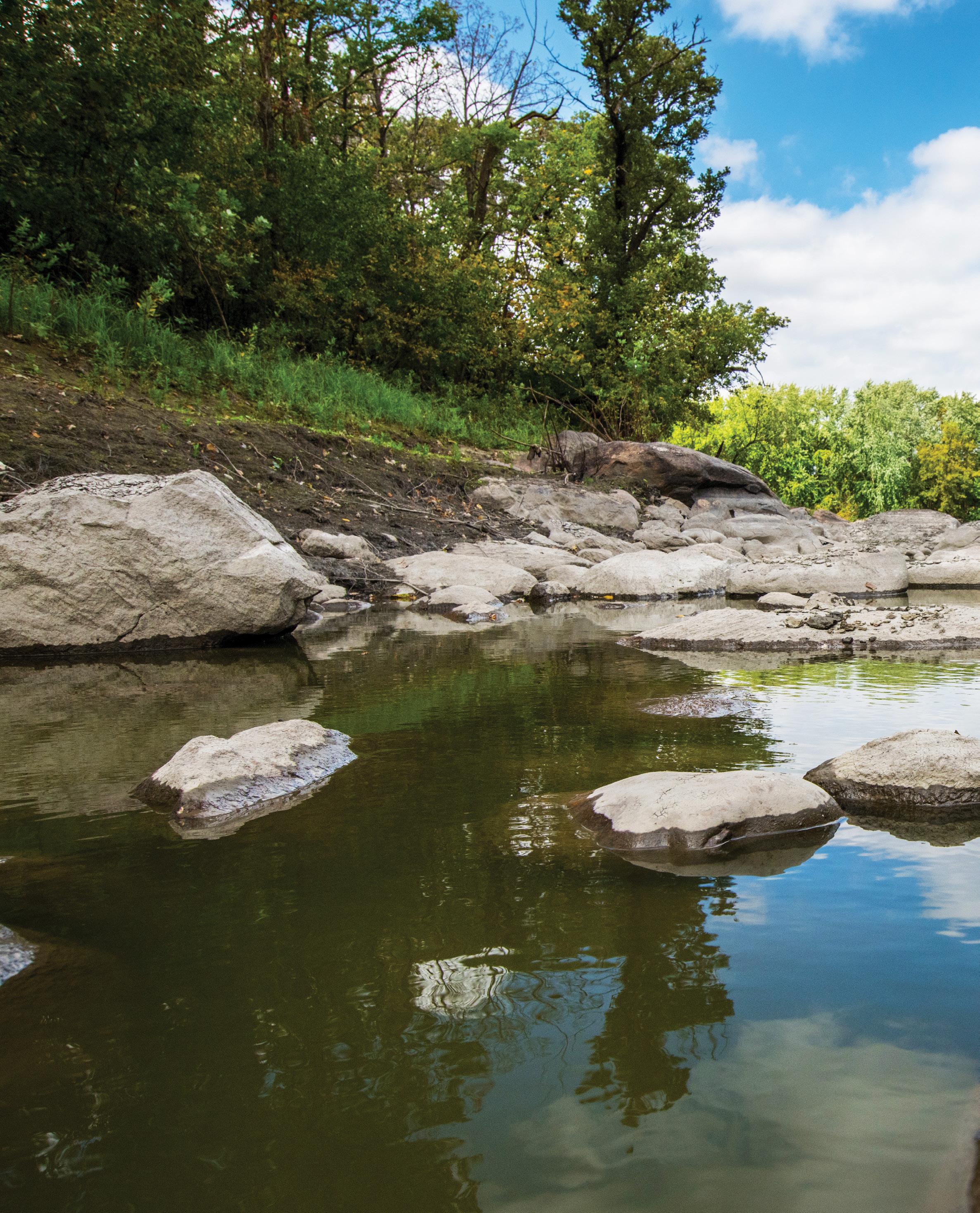



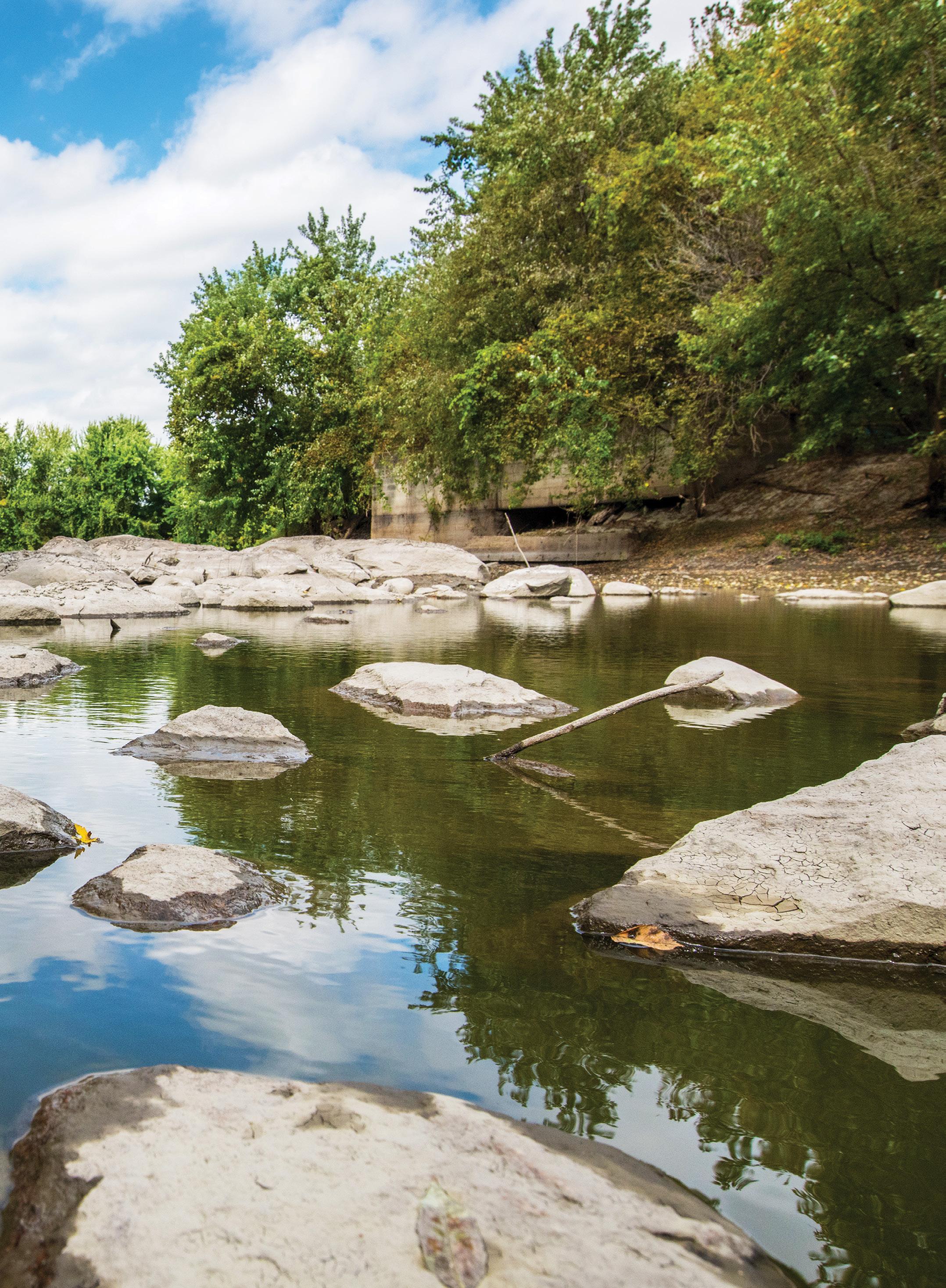
The SMSC has supported efforts to provide stable housing across Minnesota for years. Through various economic development and infrastructure donations, the SMSC is committed to helping others build the foundation for self-sufficiency, a higher quality of life, and growth and prosperity.
A record number of Minnesotans are surviving harsh outdoor elements without much-needed shelter in the region’s unforgiving winter months. As a result, the Gov. Tim Walz and Lt. Gov. Peggy Flanagan Administration launched the Minnesota Winter Homeless Initiative to bring more people inside. This effort is designed to immediately increase shelter capacity across the state for Minnesotans living outside during the winter. On any given winter night, more than 1,600 Minnesotans sleep outside, including 300 children and youth.
To meet the urgent crisis needs to expand shelter and outreach during the winter, the Saint Paul & Minnesota Foundation set up the Minnesota Homeless Fund to assemble resources from philanthropy, corporate donors, and public entities. When the Minnesota Winter Homeless Initiative launched in December 2019, the response was rapid and impactful. With the help of a $100,000 donation from the SMSC, the Minnesota Homeless Fund was able to provide shelter and low-barrier affordable housing across the state.
The number of people experiencing homelessness in Minnesota has increased by 10% in the last three years and has had a disproportionate impact on Native American communities. COVID-19 has only exacerbated the housing crisis. The high numbers of unsheltered individuals have been particularly visible in recent years, as large encampments were formed in both Minneapolis and St. Paul. In 2020, leaders from Beacon Interfaith Housing Collaborative, a nonprofit that provides housing for underserved communities in the Twin Cities, were inspired to act as they witnessed those living at the Wall of Forgotten Natives encampment.
As a result, Beacon purchased a historic seven-story building in the Warehouse District and plans to convert the building into 48 studio apartments by 2022. In partnership with the Red Lake Nation, Beacon aims to develop supportive housing for Native American individuals currently experiencing homelessness in Minneapolis. The project is called Bimosedaa—an Ojibwe word meaning “let’s walk together.” Preference will be given to members of the Red Lake Nation and other Native Americans.

The service model at Bimosedaa will allow residents to move in and gain housing stability before addressing other life challenges like chemical dependency or mental and physical health problems. Intensive case management services will be available on-site to support residents in their journeys to recovery. Supported in part by a $100,000 donation from the SMSC, Beacon will help make the vision of Bimosedaa a reality for our Native neighbors in need of safety, stability, and support.
In addition to the Bimosedaa project, the SMSC granted Beacon $250,000 in 2022 for Prairie Pointe, a 42-unit, state-of-the-art, affordable supportive housing project in Shakopee. Prairie Pointe will support families impacted by the child welfare system by providing the resources and support needed to keep families together. The building is poised to deliver multi-faceted, comprehensive, and transformative services to both resident and local area families. The SMSC is excited to be part of this ongoing partnership and supporting the need for everyone to have a place to call home.
Shelter and housing are basic human necessities, but many households end up paying more than 30% of their total income toward rental housing each year. Fortunately, local organizations see a need for affordable housing ownership, and in 2019, the SMSC granted Twin Cities Habitat for Humanity (TCHFH)
$150,000 and a construction team to assist in providing local families with just that.
When the project is complete, 12 townhome units will provide affordable housing to local families who earn between 30-80% of the area median income. As a result of various outreach strategies, TCHFH has received more than 30 eligible submissions so far from local families who may choose to enter a financial coaching program, which will make them eligible for the purchase of one of the townhomes.
Initial funding from the SMSC has gone to support the development of the property, the extension of the surrounding road, architectural development, and the installation of sewer, water, and retaining walls.
Further site development began in fall 2021, and volunteer implementation began in winter 2022. TCHFH hopes to construct one townhome complex each year and have the entire project completed by 2024.
The SMSC has a long-running partnership with TCHFH, having now contributed $260,000 to the nonprofit’s activities since 2001. The #SMSCgives Employee Outreach Program provided nearly 600 hours of volunteer time and services donated to this project.
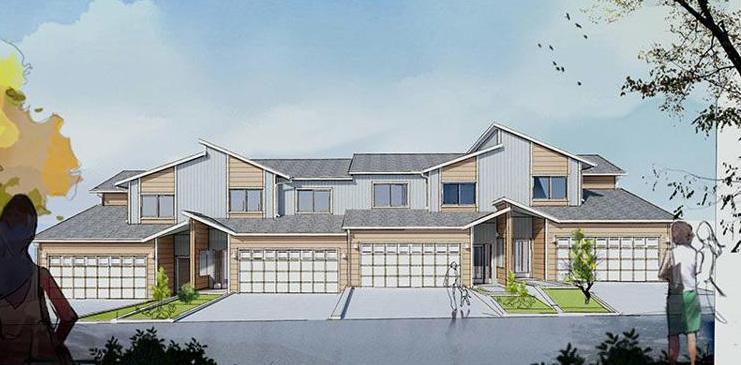
MAKING FUN ACCESSIBLE
Creating accessible spaces does more than make activities safer for those with disabilities. It also creates a welcoming environment for all and gives everyone “a seat at the table.” Or in this case, “a seat on the playground swings.”
$25 500
After receiving a request from the Redwood Area Community Friends of the Park, the SMSC committed to donating $25,500 to cover the remaining costs of building an inclusive playground in Redwood Falls, Minnesota.
The project is nearly complete and once it is finished, children of all abilities will have the opportunity to engage and socialize in a safer and much more inviting way. It is projects like these that lift up our surrounding communities and show that it is possible to be inclusive in many aspects of life.
In 2019, the only grocery store in Niobrara, Nebraska, closed after 55 years of family operation. With the nearest grocery stores about 15 miles away and Yankton, a regional trade center, located 45 miles away, Niobrara would become a “food desert.”
The Ponca Tribe of Nebraska wanted to ensure a reliable local food supply for the town of 400 residents, so it purchased and remodeled the store with the support of a $250,000 donation from the SMSC. Niobrara is in the center of the Ponca homelands and is the home of Ponca’s Tribal Headquarters.
In November 2020, the Ponca Tribe celebrated the opening of Niobrara Market, the first grocery store owned by the Ponca Tribe of Nebraska. The tribe made capital improvements inside and outside of the store and purchased new equipment, coolers, and freezers. New inventory reflects the needs of the Native community, providing farm fresh eggs and fresh local produce. The store also accepts call-in orders and delivers groceries twice a week to those in need.
The grocery store will help sustain this small tribal community for years to come, fulfilling the community’s need for fresh food, hiring Native American employees, and ensuring the economic sustainability of Niobrara, Nebraska.
The Bois Forte Band of Chippewa has struggled with its local telecommunication carriers to support the needs of the Band and provide adequate and cost-effective internet service throughout the reservation. To better support the tribe’s technology needs, Bois Forte contracted with Cooperative Network Services out of Menahga, Minnesota, to design and engineer a complete fiber optics project for area homes. The design encompasses all four sectors of the reservation (Indian Point, Nett Lake, Palmquist, and Vermilion), and will provide service to all tribal members regardless of their location on the reservation. The buildout will provide the homes with access to broadband with download speeds of at least 100 megabits per second and upload speeds of at least 20 megabits per second to all residents, meeting the state of Minnesota’s 2026 broadband goals.
The current lack of broadband services creates a strategic disadvantage for the tribe. Bois Forte tribal government is continuing to reorganize and rethink its employment strategy and has plans to move in the direction of teleworking. This strategy will allow for additional
space for services, cost reductions for employees, and more employment throughout the entire reservation.
The completed project will have an impact throughout the reservation unlike any other project that has been considered or constructed, as it will benefit each and every child, household, and business residing on the Bois Forte Reservation.
To help fund the project, Bois Forte applied for the Minnesota Department of Employment and Economic Development (DEED) Border-to-Border Broadband Development Grant. The application requires a 50% minimum match in order to be considered. The SMSC provided a matching donation to the Bois Forte Band of Chippewa in the amount of $579,273, which will provide a 25% cash match toward the grant submittal. With the help of a 25% matching grant from the SMSC, the Bois Forte Band will be able to start building the much-needed infrastructure on the reservation.
In March 2022, the SMSC granted a $500,000 donation to the Bois Forte Band of Chippewa for the acquisition of 28,089 acres of land on the Nett Lake and Deer Creek Reservations in northern Minnesota. As a fellow sovereign nation, the SMSC understands the importance of purchasing land and expanding reservation boundaries. It is our honor to help another Native American tribe protect and preserve their lands for future generations.
The Grand Portage Band of Lake Superior Chippewa is a small band located in far northeastern Minnesota. Its government, community programs, member services, and enterprises are managed centrally by one information technology (IT) department. The Band serves more than 1,000 members on and off the reservation and is the largest employer in the area. It had been many years since the Band has been able to invest in IT infrastructure, leaving systems vulnerable.
$490734
In July 2019, the Grand Portage Band of Lake Superior Chippewa’s tribal government and its financial enterprises were hacked with ransomware that entirely incapacitated the tribal government. The ransomware affected the Band’s associated revenue production from the casino, lodge, and convenience store. The ransomware cost the tribe more than $1 million due to loss of revenue, the ransom itself, loss of staff time, and loss of tribal data. Following this incident, the SMSC provided an extra server to Grand Portage to assist them in their immediate time of need.
In 2021, Grand Portage was awarded a grant in the amount of $490,734 to assist with updating and modernizing its IT capacity. The grant will allow the tribe to secure updated hardware and software, including anti-virus and anti-malware protection.
To enhance their skills and engage in knowledgesharing through professional development, tribal land professionals from more than 170 tribes have attended the Tribal Land Staff National Conference since 2011.
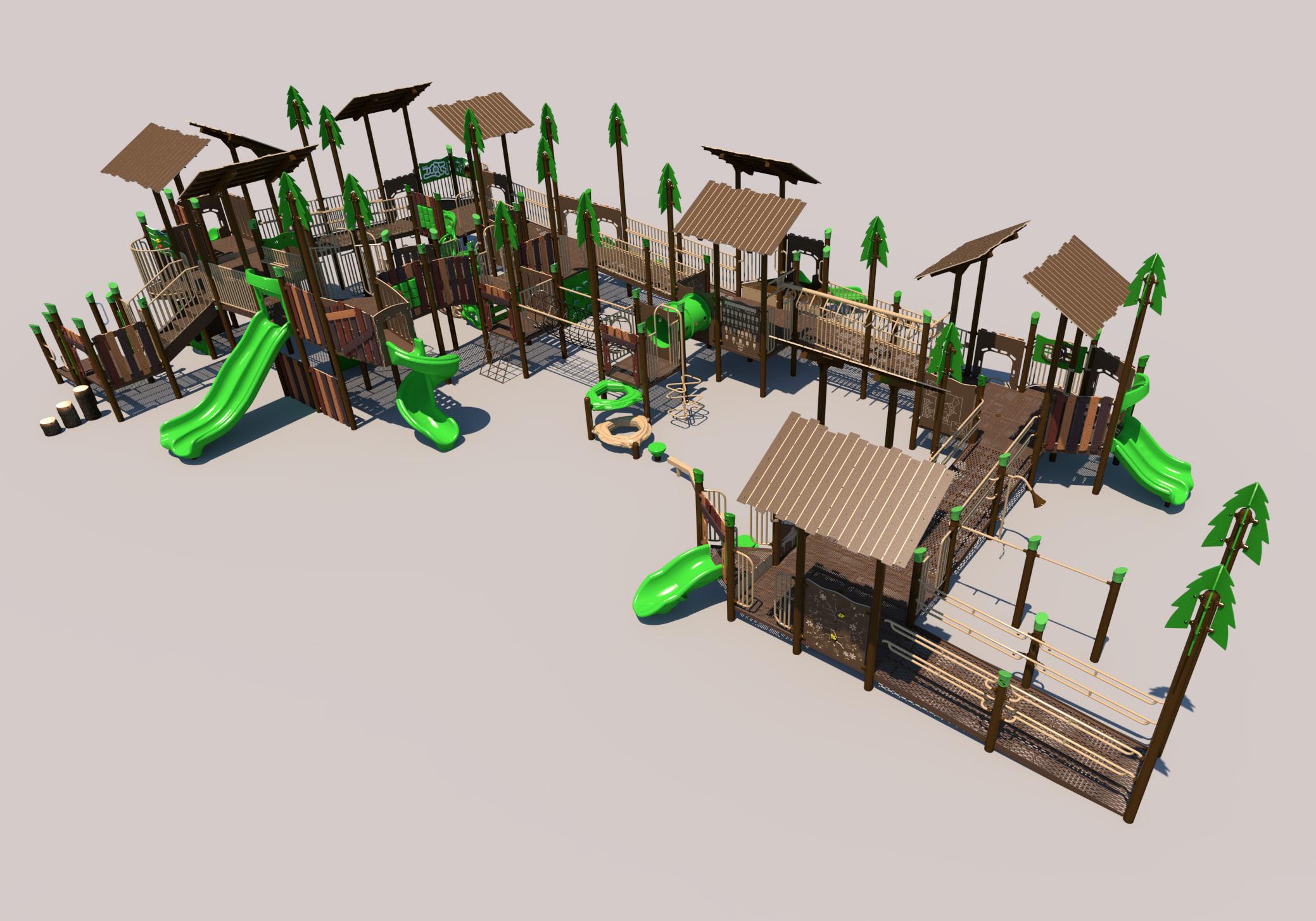

$15000
Co-hosted by the National Tribal Land Association (NTLA) and the Indian Land Tenure foundation (ILTF), the conference aims to provide networking professional development opportunities to staff managing and operating tribal land offices across Indian Country. Over the course of three days, attendees had the opportunity to meet and share expertise and resources with their peers, while receiving practical training on strengthening the management of tribal land operations.
Since 2019, the SMSC has been honored to sponsor this important event and contribute funds—including $15,000 in fiscal year 2022—in support of the NTLA and ILTF.
Located on the Pine Ridge Indian Reservation in the small town of Wanblee, South Dakota, Crazy Horse School is a tribally controlled K-12 school offering culturally based education to 120 students. With a mission to provide a sacred environment for students to achieve academic and cultural excellence, the school strives to offer the very best for their students.
$454678
Faced with a worn, weathered, and ultimately unsafe playground on school property, Crazy Horse School set into motion plans to replace the equipment with a new playground that accommodates the physical needs of all its students. Thanks in part to a $454,678 contribution from the SMSC, Crazy Horse School was able to achieve this objective in 2022 and provide its students with new, accessible playground equipment. Having a new playground not only provides the students with a safe outdoor space to play and exercise, it also offers a comfortable and appealing space for youth of all ages to relax, socialize, and celebrate being together for many years to come.
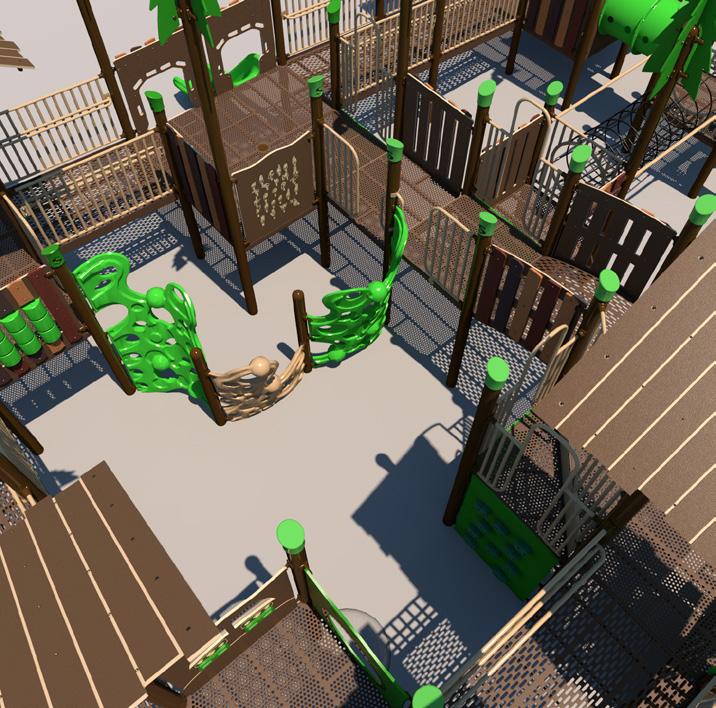
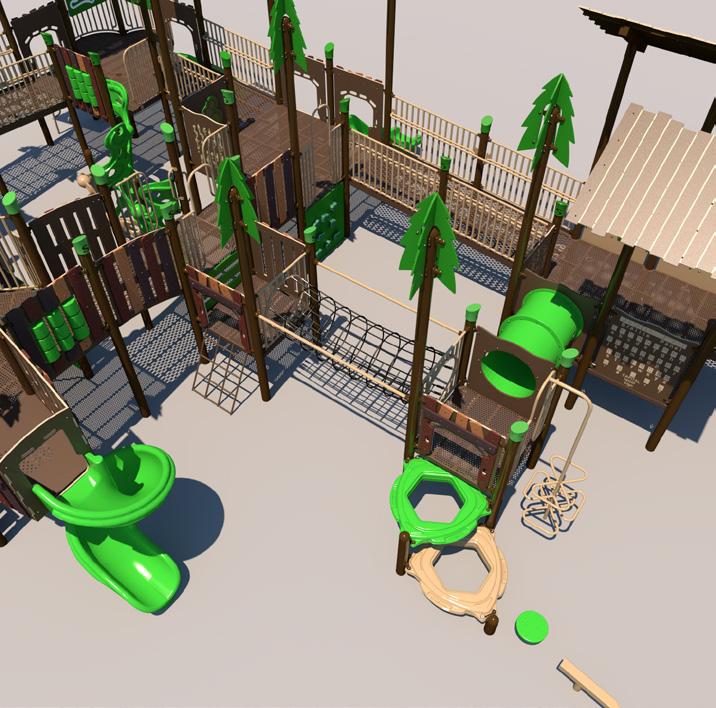
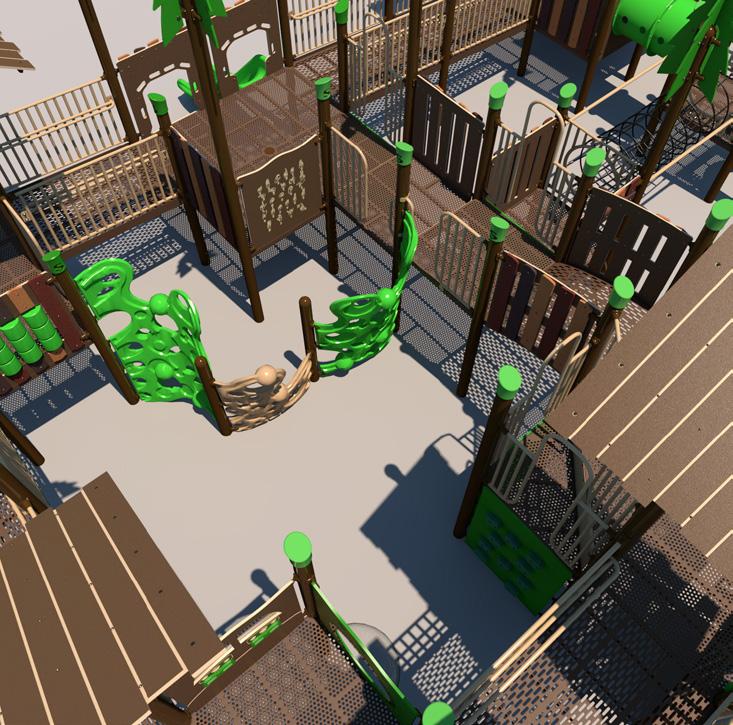
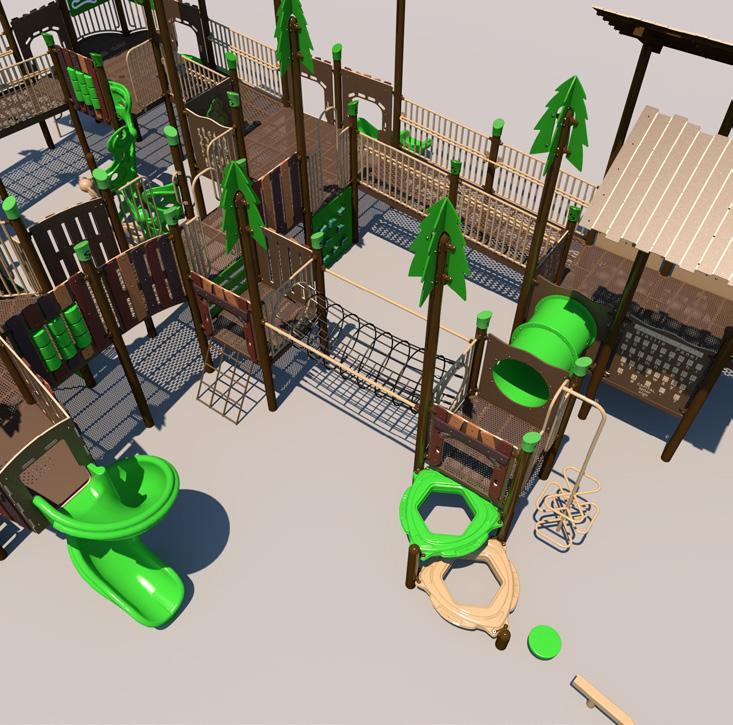

For more than 45 years, Homeward Bound Inc. has provided quality and innovative services to support children, teens, and adults with disabilities in leading more fulfilling lives. The nonprofit organization currently operates 20 residential homes and an in-home and Independent Housing Options Program (IHO) for persons with mild disabilities in the Twin Cities metro area. The organization’s in-home services allow families to remain together in their own home with the support of Homeward
$5000
In an effort to support those with mild disabilities who wish to own or rent their own apartment, condo, or home, the SMSC granted Homeward Bound $5,000 to help remodel the Homeward Bound Atwood House, which is home to three young men and one young woman with mental and physical disabilities. In spite of its convenient location in Hopkins, Minnesota, the house’s original layout and features were in need of significant improvement to provide the residents with a comfortable, safe place to call home—for example, the laundry was in the basement, there was only one bathroom, and the living room was far too small. With the help of the grant, the house received an addition of a large family room, bathroom, and laundry area on the first floor of the home. Not only will the donation help the individuals living there to be more comfortable, but it will also help Homeward Bound to retain and hire staff for the home.
Since 1977, MIGIZI, meaning “bald eagle” in Ojibwe, has been an Indigenousled organization, providing a strong circle of support that nurtures the education, social, economic, and cultural development of American Indian youth. In June 2020, amid civil unrest following the murder of George Floyd, MIGIZI lost its newly constructed building to arson. This was not simply a loss only for the organization and its employees, but for the Lake Street community and the Native youth of Minneapolis who have been served and supported by the organization for over four decades.
$500000
voices, MIGIZI set about making plans to rebuild the home they lost. Reflecting a variety of Indigenous worldviews, the new facility will integrate the group’s mission into the physical design of the building and will support robust programming, with the aim of reaching and serving an even larger population of Native youth.
Although devastated by the loss, the MIGIZI circle come together with a renewed energy toward the future and the resolve to begin anew. With the guidance of young, Native
With the support of the SMSC and many other organizations, MIGIZI has begun renovating their new home at 1845 Lake Street in South Minneapolis. In total, the project is estimated to cost $5.5 million and is projected to open in late summer of 2023. Thanks to the dedication of the community partners, organizers, and donors who rallied around the group, MIGIZI will be able to continue its nurturing mission of developing and supporting Native youth living in Minneapolis and the surrounding area.
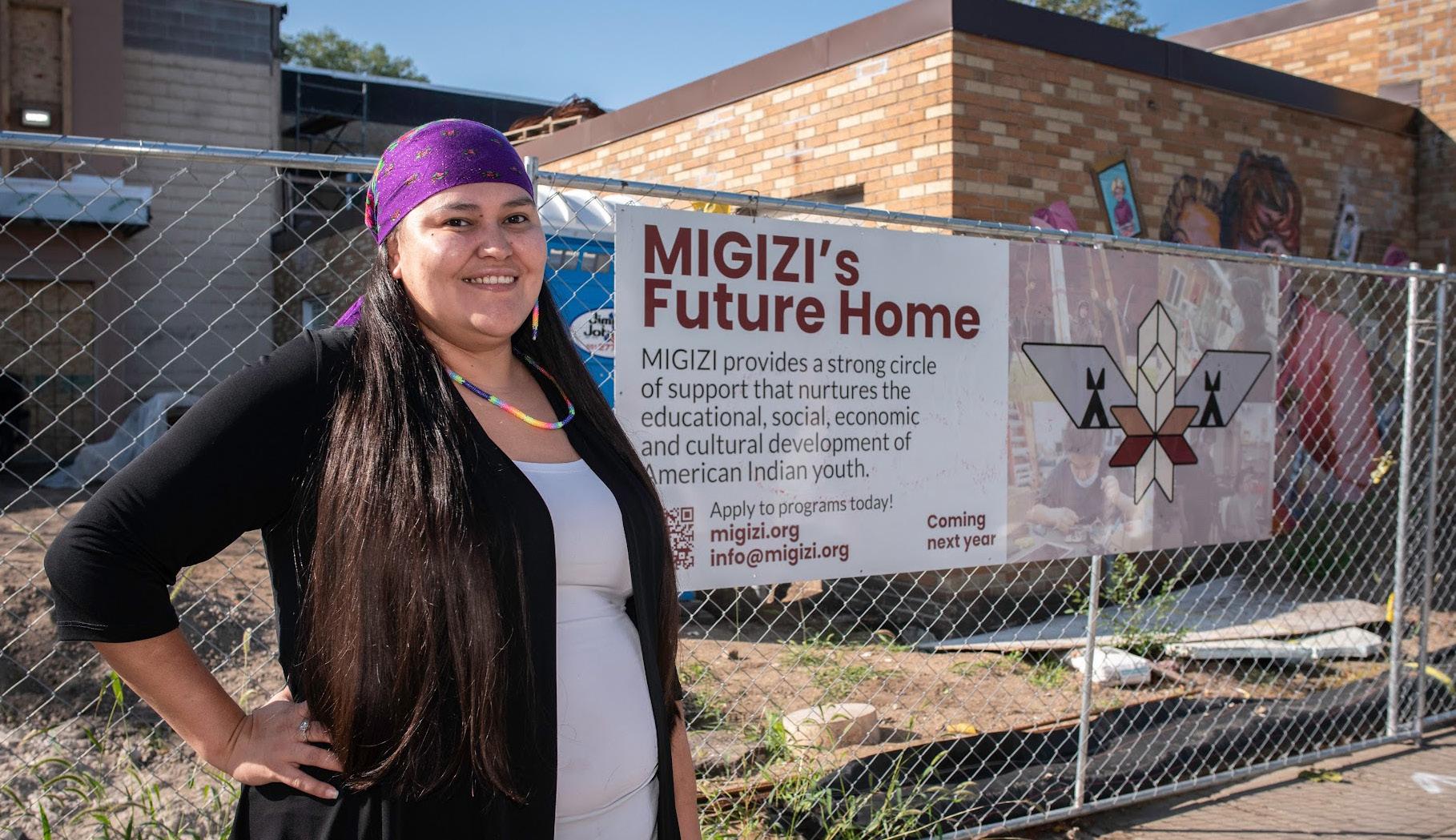
The Lift Garage opened in 2013 with the goal of helping low-income families and individuals access affordable car repairs—a frequent trigger for job loss and homelessness. Lowincome individuals and families are disproportionately affected when their cars break down. Their ability to maintain employment, get their kids to daycare, travel to medical appointments, and provide for themselves or their families is threatened. In 2022, The Lift Garage anticipates serving 1,400 customers, including 100 Native Americans, who are 7.7% of the their yearly clients.
$2 000
for low-income people. Through donations from foundations, corporations, individuals, and supporters such as the SMSC, The Lift Garage is able to sustain its programs and help out those in need. Furthermore, The Lift Garage helps to move people out of poverty and homelessness by providing low-cost car repair, free pre-purchase inspections, and honest advice that supports the local community on the road to more secure lives.
The economic fallout from COVID-19 dramatically worsened the chronic instability low-income individuals and families were already experiencing. An affordable car repair isn’t going to fix everything, but the SMSC is proud to be a part of a program that gives hope and a sense of empowerment to those who need it most.
The Lift Garage is the only nonprofit in the seven-county Twin Cities metro area that operates full-time to repair cars
The Minneapolis American Indian Center (MAIC) is a nonprofit community center in the heart of the American Indian community of Minneapolis. One of the first urban American Indian centers in the country, the Minneapolis American Indian Center was founded in 1975 to provide services otherwise unavailable for urban American Indians. The center serves a large and tribally diverse urban American Indian population that numbers over 35,000 in the elevencounty Minnesota-St. Paul metro area. The Minneapolis American Indian Center was initially formed by community members and continues its roots today with majority Native leadership and staffing.
$1 500000
for children, youth, and families; comprehensive youth development programming; elders’ services; employment training and job placement services; and health promotion through physical activity and nutrition education. The Minneapolis American Indian Center’s programs promote the goals of self-determination, dignity, equity, sustainability, and preserving and sharing cultural traditions.
The Minneapolis American Indian Center’s mission is to provide excellent services within a foundation of cultural values that help meet the needs of the American Indian community. Its programs include social services and advocacy
As long-time supporters of the Minneapolis American Indian Center and its mission, the SMSC has contributed $1.5 million to the All Roads Campaign, which will allow for substantial renovation and expansion of the facility. Built in 1974, the facility has experienced heavy use over the past 45 years and required a significant capital investment to expand the center to its fullest potential. The All Roads Campaign will restore and preserve the existing 43,486-square-foot facility while adding approximately 21,576 square feet of new facility space. Groundbreaking for the project took place in September 2022 with occupancy expected to occur in the fall of 2023.



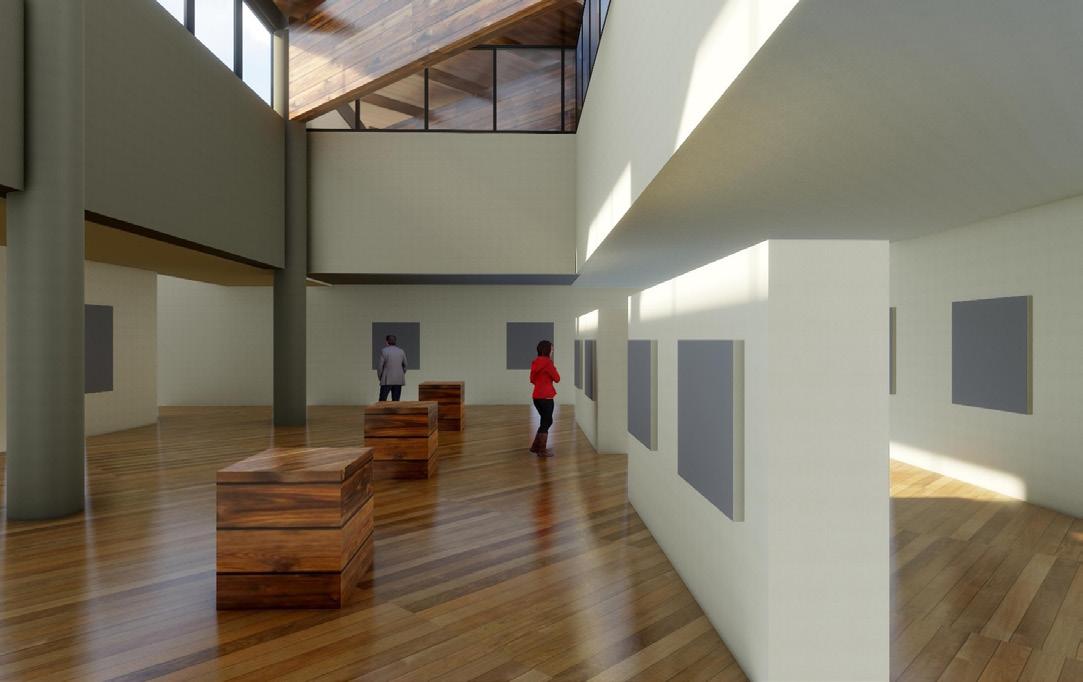
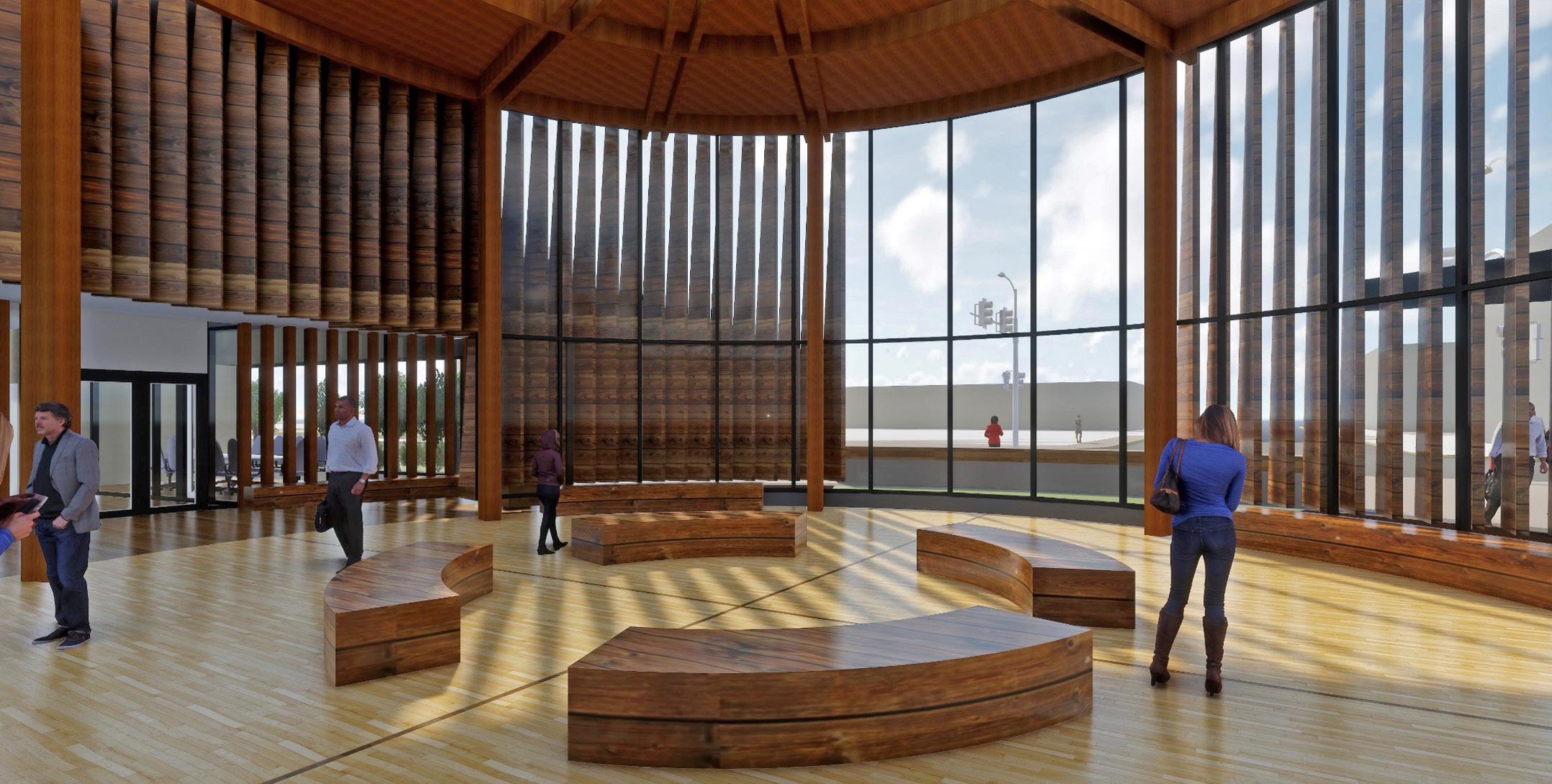





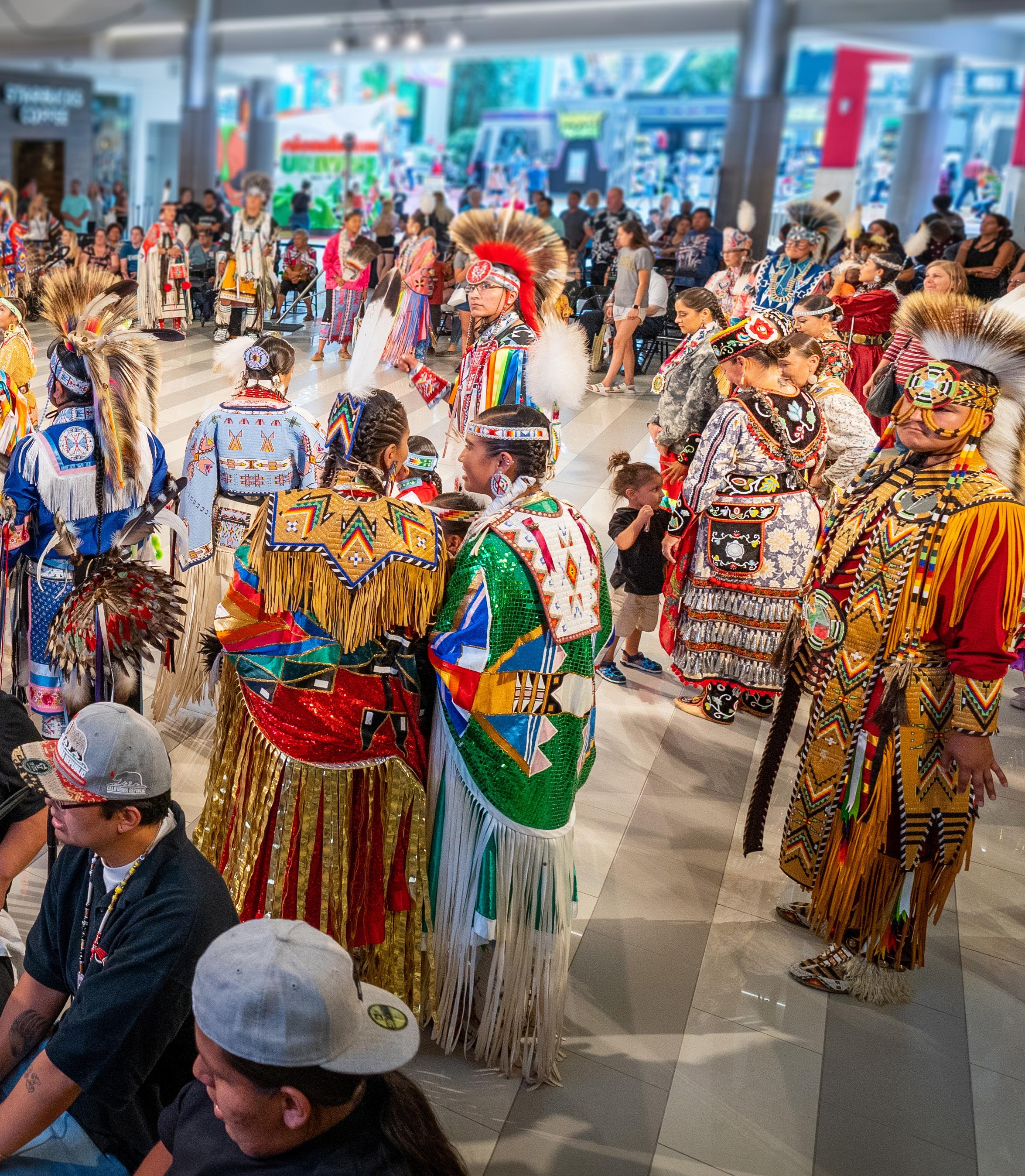
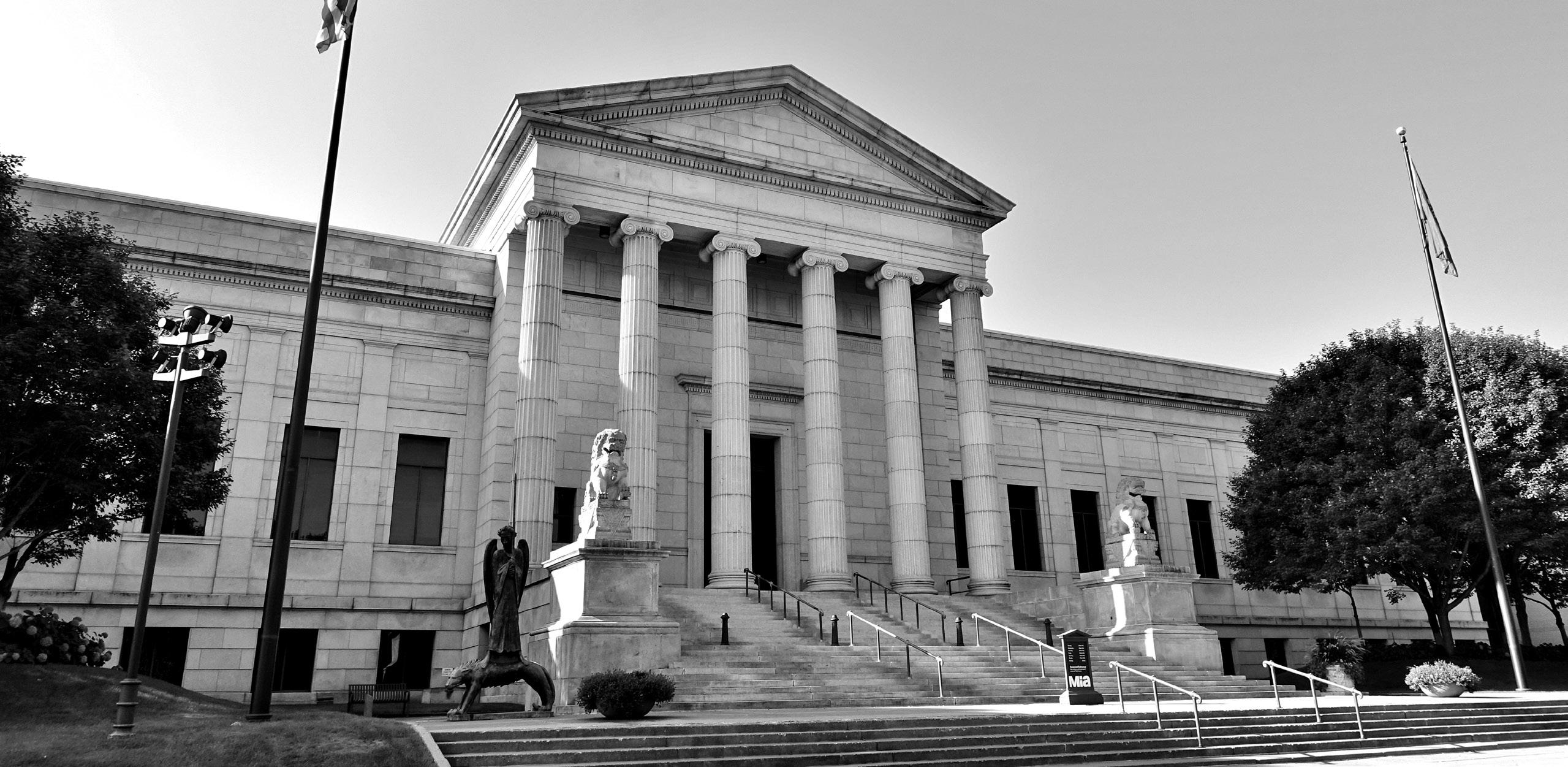
Inspiring wonder through the power of art, the Minneapolis Institute of Art (Mia) collects, preserves, and ensures accessibility to outstanding works of art from the world’s diverse cultures. Furthermore, Mia’s wide range of programs, permanent gallery rotations, and special exhibitions showcasing Native American art provides the foundation on which to engage and involve Native people in the museum’s work. In spring 2020, the SMSC donated $250,000 to Mia for two such projects—an Indigenous artist collective installation from Postcommodity and the expansion of the museum’s renowned Native American Fellowship Program.
The SMSC and Mia share a longstanding partnership, dating back several decades. Most recently, the SMSC was a presenting sponsor of Mia’s 2019 groundbreaking exhibition “Hearts of Our People: Native Women Artists,” which culminated in a nationwide traveling tour. The exhibition was scheduled to be on view from February-May 2020 at the Smithsonian’s Renwick Gallery in Washington, D.C., but was cut short when the Smithsonian closed its museums as a public health precaution to help contain the spread of COVID-19.
Through works of art created by 20 artists from countries all over the world, a traveling exhibition called “When Home Won’t Let You Stay: Art and Migration” was displayed at Mia in spring 2020. The collection highlights diverse artistic responses to migration and features a range of mediums, including sculpture, installation, painting, and video.
As part of this exhibition, Mia commissioned Postcommodity—an interdisciplinary arts collective—to create a site-specific installation that comments on the complexity of human relationships bound by shared sources of water that are increasingly difficult to protect. Titled “Let Us Pray for the Water Between Us,” artists
Cristóbal Martinez and Kade L. Twist transformed a 2,200-gallon agricultural chemical storage tank into a self-playing automated drum that resounds rhythms derived from Dakota songs.
On display in the museum’s historical rotunda, the drum serves as an
The Shakopee Mdewakanton Sioux Community has supported this fellowship program at the Minneapolis Institute of Arts for more than 15 years, and we look forward to it expanding into a full-time program this year. We hope this fellowship will provide a good opportunity for up-andcoming arts professionals and encourage more Indigenous curators in this field.
important symbol of the extraction of natural resources and the pollution of tribal community lands and water. “It is a prayer for greater respect, accountability, and transparency among state and federal governments, and corporations to tribal governments, and communities around the appropriate management of our shared natural resources,” Martinez and Twist said of their work.
As one of the only art museums in the Twin Cities with dedicated permanent gallery space for Native American artwork, Mia plays an important role in helping the region learn more about the art, culture, and living traditions of Native Americans. This is especially notable as the museum resides within a neighborhood of Minneapolis that is home to one of the largest urban Native American populations in the country.
In fiscal year 2022, the SMSC donated another $125,000 to a first-of-its-kind Native photography exhibition that will debut in fall 2023. The exhibition will underscore the foundational role of Native photographers upon development of the medium and showcase photographic works of art rarely seen together by the public. The SMSC also committed an additional $100,000 in fiscal year 2022 to Mia’s Native American Fellowship Program.
For more than 15 years, Mia has provided a robust professional development experience for Natives in the
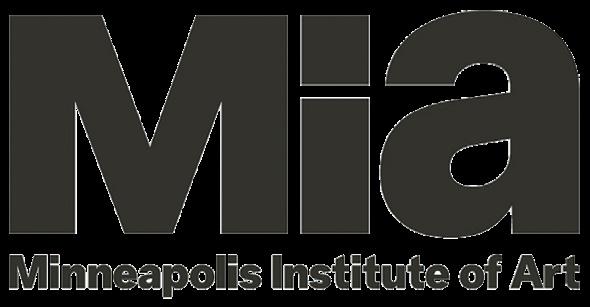
museum field through its Native American Fellowship Program. Native American artists work alongside Mia staff and contribute their talents to projects that help care for, present, and interpret Native American works of art. To help increase the number of Indigenous curators in this field, a portion of the SMSC’s donation is designated for the expansion of Mia’s fellowship program. In the hopes of enhancing the fellows’ skills and experiences, the expanded program will lend itself to collaborative opportunities with nearby curatorial facilities, such as Hoċokata Ti, the SMSC’s cultural center.
“Thank you for the SMSC’s generous partnership with Mia and for supporting the museum’s work to enrich our community through the power and wonder of art,” said Katherine Crawford Luber, Mia’s Nivin and Duncan MacMillan director and president. “We also appreciate the support for our fellowship program, which offers artists opportunities to contribute their talents to projects that help care for, present, and interpret Native American works of art and engage our community with these incredible objects.”
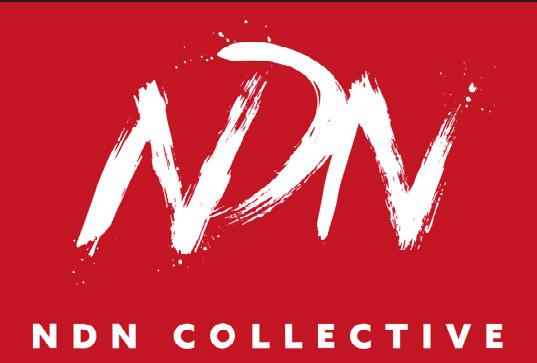
Based in Rapid City, South Dakota, NDN Collective, Inc., is an Indigenous-led organization dedicated to building and promoting Indigenous self-determination and working toward equity and justice for all people and the planet. NDN’s team of community organizers works in close relationship with dozens of grassroots movements across Indigenous communities, creating real partnerships by stewarding and growing power in Indigenous communities.
By providing access to meaningful resources, strategic support, and communications strategies meant to amplify stories and narratives that challenge stereotypes, NDN Collective highlights the amazing work that happens when Indigenous people are put in control of their own lives. The SMSC supports this powerful movement of Indigenous self-determination and donated $250,000 to NDN Collective in fiscal year 2020. These funds are dedicated to two specific initiatives: the NDN Prize and the NDN Changemaker Fellowship.
The NDN Prize is an annual $1 million discretionary award that is given to an Indigenous-led organization that exemplifies models of Indigenous self-determination, innovation, and creativity. Fully funded by tribal philanthropy as a way to empower and inspire, the prize creates a unique space for Native communities to celebrate their own successes with each other. The prize is awarded to organizations and individuals working in the following three areas:
DEFEND. We must continue to defend our people, communities, and nations against negative resource extraction that poisons our people, pollutes our water, destroys our land, contributes to climate change, and violates our human rights.
DEVELOP. We must continue to develop Indigenous communities in a regenerative and sustainable manner, based on our values and connection to land, culture, and identity. We need to meet the needs of the present generation without compromising the ability of future generations to meet their own needs.
DECOLONIZE. We must continue to decolonize our minds, communities, and sovereign nations. Through the revitalization of our Indigenous ceremonies, culture, languages, and ways of life, we will continue to strengthen our identities.
The NDN Changemaker Fellowship invests in the visions, leadership, and development of Indigenous changemakers, and will be awarded to 21 people across North America who are working to defend, develop, and decolonize their communities and nations. Launching in 2021, the 12-month fellowship will pave the way for fellows to foster creativity, innovation, and determination to build healthy, resilient futures in their communities for generations to come.
By increasing its philanthropic investment to Indigenous-led organizations—such as NDN Collective—the SMSC is helping build the collective power and voices of Indigenous communities. Perhaps most importantly, this investment places resources in the hands of those most affected by challenges, so they can solve problems in ways that work best for their communities.
A TIME OF HEALING, TEACHING, AND PRAYER
Every September, Native Americans from tribes across Minnesota, North Dakota, South Dakota, Nebraska, Canada, and others gather in Mankato’s Land of Memories Park, where the Dakota people held many ceremonies and gatherings before the U.S.-Dakota War of 1862. The conflict resulted in the execution of 38 Dakota warriors in Mankato on December 26, 1862. The Mahkato Annual Traditional Wacipi is a memorial
gathering of the Dakota to remember and honor those who were hung in the largest mass execution in United States history.
$36000
Held in Mankato since 1972, the three-day Mahkato Annual Traditional Wacipi is a time for healing, teaching, and prayer, as well as an opportunity to showcase traditional dance, games, delicious foods, crafts, honor songs, stories, and more. The SMSC has long contributed to the event, including an $18,000 donation in 2021 and 2022.

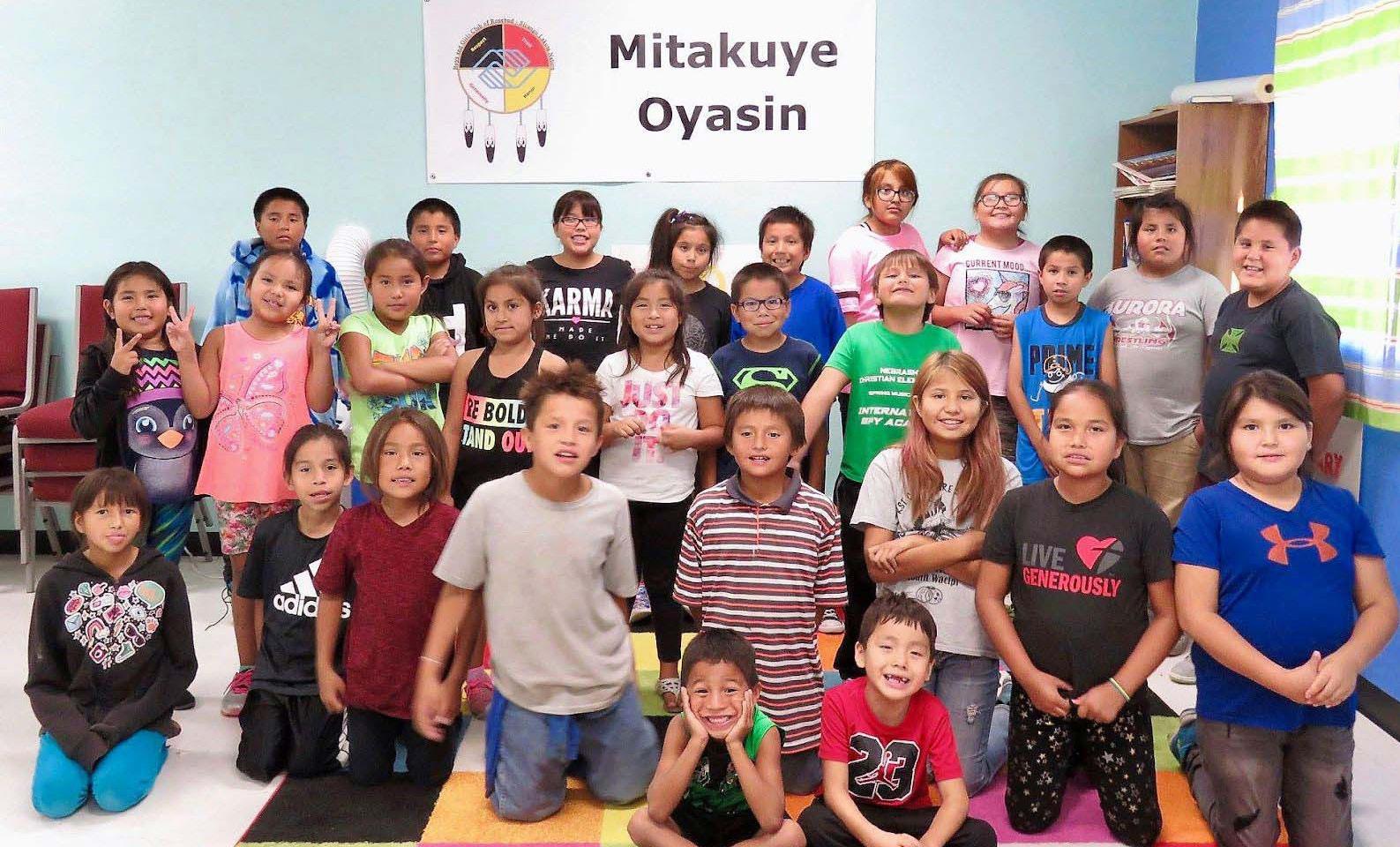
The Boys and Girls Club of Rosebud in Mission, South Dakota, believes youth are sacred. The organization works to enable youth, especially those who need it most, to reach their full potential as productive, caring, and responsible citizens. The SMSC is a strong, consistent supporter of the Boys and Girls Club’s work with the youth of the Rosebud Reservation.
$25000
In fiscal year 2019, the SMSC provided a $25,000 grant to the Boys and Girls Club of Rosebud to help establish a new, permanent youth center in the Parmelee community. And in
fiscal year 2021, it provided a matching grant of $25,000 to complete the project. This center will serve, feed, and support local youth for years to come.
The Boys and Girls Club of Rosebud works to help youth achieve academic success, build healthy lifestyles, and develop strong characters. Two key tenets of its strategy are consistency in attendance (building ongoing, steady relationships through attendance at least four days a week) and retention of its members (investing in their lives all the way to high school graduation, with minimal drop-off during middle school years). Every day at the center, kids can count on a hot, healthy meal, adults who really care about them, and programs designed to position them for success.
The 7G Foundation is a group of entrepreneurs, coaches, and tribal leaders dedicated to molding the next seven generations of Native leaders through education, athletics, culture, and real-world support. Beginning in 2017, the 7G Foundation has organized the Indigenous Bowl for high school seniors of Native American descent who have not yet enrolled full-time in college. The event is an opportunity for young, Native athletes from across the country to showcase their talent on the football field, work with coaches and mentors, and develop the skills necessary to move to the next level of competition.
$15000
The 7G Foundation, National Football League, and Minnesota Vikings announced a new partnership for the 2021 Indigenous Bowl, with the Vikings hosting the event on December 5, 2021, at U.S. Bank Stadium in Minneapolis. A roster of approximately 60 Native youths had the opportunity to participate in the bowl, which was open to the public at no charge and livestreamed by the Vikings. The SMSC provided a $15,000 sponsorship to help support these student athletes.
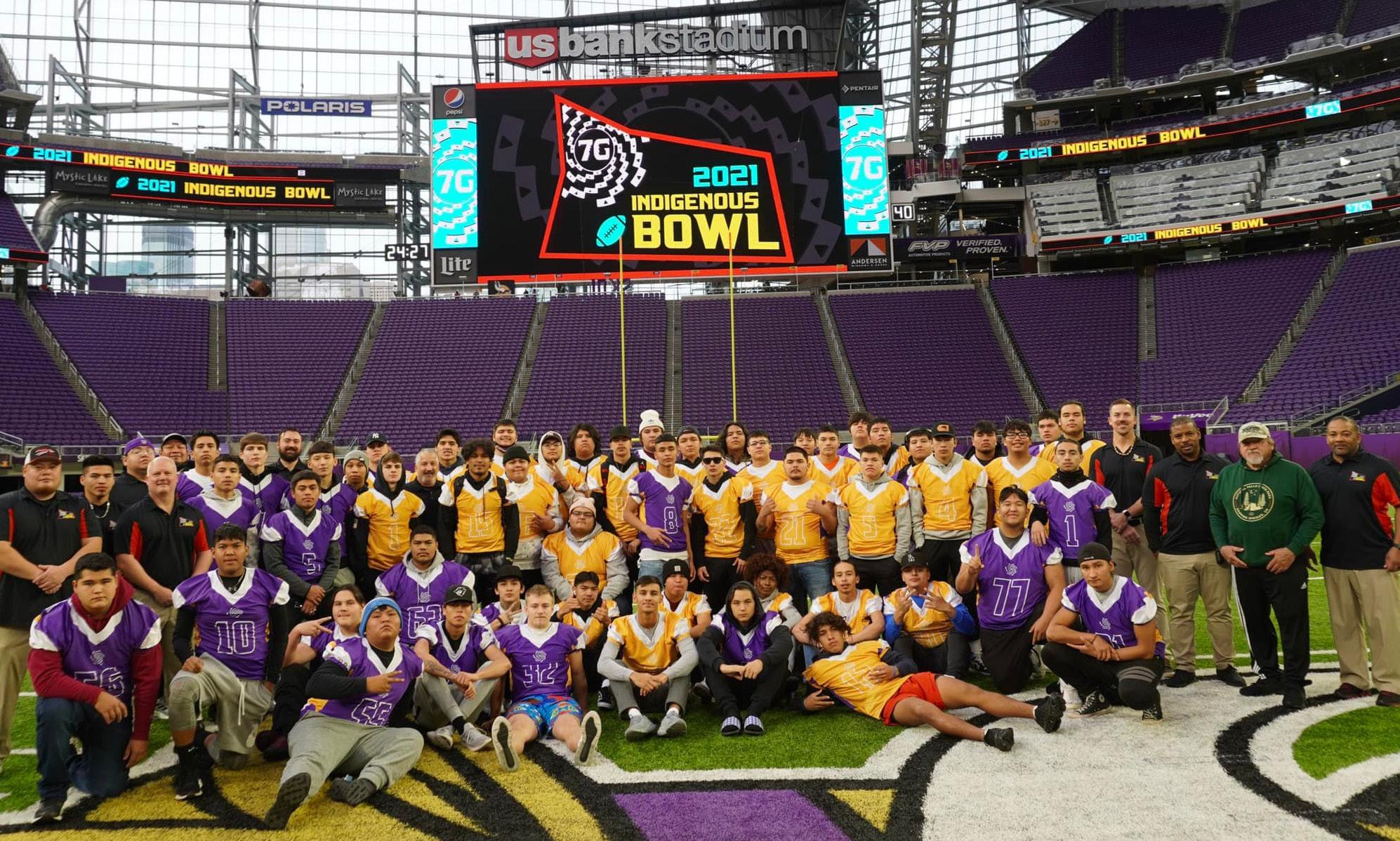
Many of our people were major contributors to the game of American football from its conception, and it’s time to celebrate that through today’s generation and those of tomorrow,
– 7G FOUNDATION EXECUTIVE DIRECTOR BENNAE CALACWilderness Inquiry connects people of all ages, backgrounds, and abilities to each other and the natural world through shared outdoor adventures. For 43 years, it has provided access to the outdoors as a vital resource that can improve social, economic, academic, and health outcomes.
$8000
Through the challenges of COVID-19 and the impact of the pandemic on connection, learning, and engagement for youth and families, Wilderness Inquiry’s inclusive outdoor programs have been as important as ever to invest in the mental, physical, and emotional health of its diverse community of participants. In the summer of 2021, the SMSC sponsored Wilderness Inquiry’s Great River Race, which raises awareness and support for its Canoemobile youth program.
Wilderness Inquiry’s “floating classroom” Canoemobile brings outdoor learning to life through place-based educational programs on waterways and public lands. The program engages youth to improve school performance, cultivates a stewardship ethic, and creates pathways to pursue educational and career opportunities in the outdoors. Canoemobile reaches more than 15,000 underserved youth in more than 50 cities across Minnesota and around the country each year, including the Twin Cities metro, Shakopee, Rochester, Austin, Duluth, St. Cloud, Grand Rapids, Bemidji, Thief River Falls, and across the Boundary Waters. For 80% of participants, Canoemobile is their first outdoor experience.
The SMSC’s $3,000 (2021) and $5,000 (2022) investment in Canoemobile and Wilderness Inquiry’s inclusive programs helped engage youth in the science and history of the Mississippi River and supported outdoor learning and exploration for students.
In August 2021, the Dakota Oyate, Minnesota Humanities Center, and the Lower Sioux Agency hosted a two-day Dakota History Symposium with a mission to raise awareness of the underrepresented Dakota narrative by educating the public, local leaders, and Dakota/ Lakota/Nakota youth.
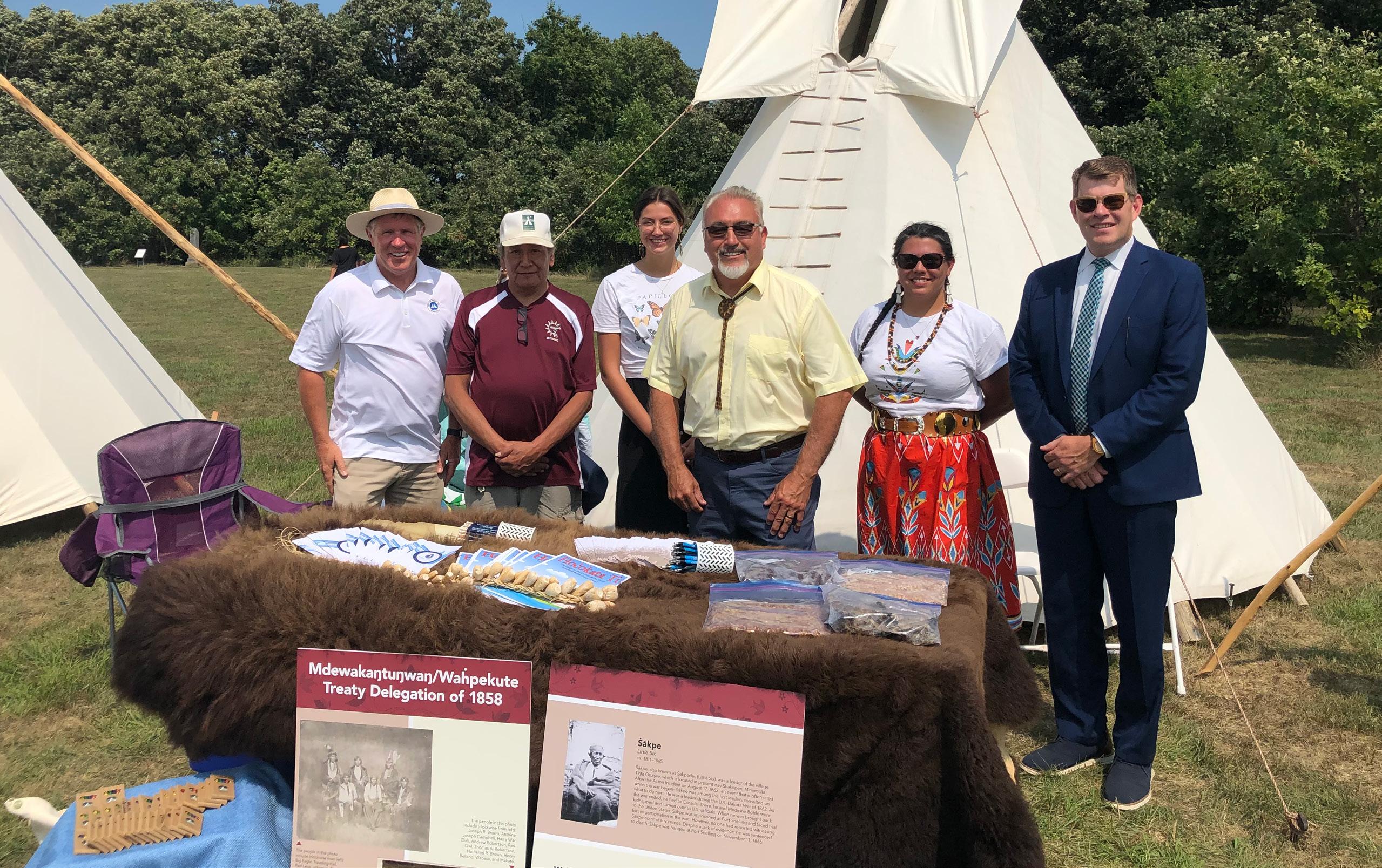
$5000
The symposium event—which was attended by the SMSC Business Council and several Community Members—shared
voices, perspectives, and the cultural worldview of the Dakota through cultural teachings led by guest speakers from across the Oceti Ṡakowiŋ. These teachings were focused on truth-telling, cultural education, and oral history with a goal that participants and attendees would have a better understanding of the Minnesota Dakota before, during, and after the U.S.-Dakota War. Session topics included tribal sovereignty, Dakota language and storytelling, Indigenous games, and more.
The SMSC also donated $5,000 and a pallet of water to the event held at Lower Sioux Agency near Morton, Minnesota.
For more than a quarter century, the First Peoples Fund has been recognized as a leader in supporting Native artists and culture bearers, helping tribal communities to heal and thrive.
$25000
To celebrate its 25th anniversary, First Peoples Fund hosted an exciting series of events at the Kennedy Center in Washington, D.C., called We The Peoples Before. This four-day event was a celebration of Native art and culture through performances, workshops, film screenings, indepth discussions, and much more.
To extend the legacy of this impactful event, First Peoples Fund launched a We The Peoples Before education project, which is a set of multimedia curricula to be housed on the Kennedy Center’s digital arts education platform that reaches libraries, schools, parents, and students from across the nation.
In alignment with its own effort to get more educational resources in the hands of Minnesota’s students, the SMSC supported the We The Peoples Before event and education project with a $25,000 sponsorship, helping build momentum toward cultural equity and justice by creating this new opportunity to engage students and teachers with the work and lifeways of Native artists.
The program explores deeps truths and reflections about the history and experience of this country’s Native peoples and centers the healing, strength, and joy of Native communities for generations to come.
Prior to supporting this digital education programming, the SMSC donated $200,000 to the First Peoples Fund in 2019 toward construction of the Oglala Lakota Artspace facility, a cultural hub for sharing, learning, and practice on the Pine Ridge Indian Reservation in South Dakota.
First Peoples Fund is guided by a belief in Collective Spirit, which is a commitment to nurture our shared humanity and honor our connection to one another, the lands around us, those who came before us, and the spirit of all things.
Protecting cultural resources ensures that future generations will have the opportunity to learn about and embrace their unique cultural heritage.
Preserving resources such as artifacts, historical documents, and heirlooms requires consistent environmental controls for lighting, temperature, and humidity. Without these precise conditions, items are in a constant state of decline. Now imagine storing these pieces of history in a 300-square-foot space located within a deteriorating building constructed in 1934. That’s the current situation faced by the Ponca Tribe of Nebraska.
$1000000
The SMSC has committed $1 million over two years to the project, which—when completed—has the potential not only to preserve Ponca history, but also provide an important gathering place for tribal members, as well as much-needed space for a public museum, cultural programming (such as arts, food, and language), artifact restoration, and storage.
This project also has the potential to help the tribe repatriate important historical Poncan items, which is currently a challenge due to safekeeping and preservation concerns in the existing building. The tribe is working with Harvard University to repatriate Chief Standing Bear’s tomahawk, and a modern cultural center will help the two sides continue this effort.
To overcome this issue and sustain its culture for future generations, the Ponca Tribe is planning to construct a 9,200-square-foot museum and cultural center that would also serve as the cornerstone for other economic development strategies being planned for the Niobrara area in Nebraska.
With this latest commitment, the SMSC has given over $6.6 million to the Ponca people since 2004, with funds going toward economic development, powwows, and other grants.
The Confederated Tribes of Siletz Indians are a group of 38 distinct bands of tribes living in Oregon. Since the tribes’ federal recognition was restored in 1977, the development of a cultural heritage center and museum has been included in every tribal master plan. When built, the facility will serve as a venue for tribal members to learn about their culture and history, speak their language, and preserve important objects and artifacts for future generations. Today, the Confederated Tribes of Siletz Indians are on the cusp of realizing this long-held vision.
$250000
the tribal cultures of the Confederated Tribes of Siletz Indians.” Since its founding, the STAHS primary function has been to secure funding for the development of a cultural heritage center and museum.
Recognizing the positive impact of a cultural center based on its own experience, the SMSC donated $250,000 in fiscal year 2022 toward “A Place for the People,” a planned 20,000-square-foot facility where the nearly 6,000 members of the Confederated Tribes of Siletz Indians can learn about their history and practice their culture.
The Siletz Tribal Arts and Heritage Society (STAHS) was founded in 2012 with the mission of “supporting and promoting the practice of conservation and restoration of
While the building will be a primary resource for the tribe itself, the planned exhibits will also directly support Oregon state law which requires all students to learn about the cultures and histories of Oregon’s first people.
Mni Ki Wakan (Water is Sacred) is an organization that has created a growing ecosystem of Native water champions across the Midwest. Founded in 2017 by a council of Dakota and Lakota elders, Mni Ki Wakan is committed to advancing Indigenous water rights and water justice.
$2500
In 2019, Mni Ki Wakan created a water summit that brought together over 125 water champions, leaders, and stewards from tribal nations with the support of the SMSC. Since then, the organization has continued to strengthen key partnerships with tribal nations, water resource directors, leaders, organizations, water advocates, and researchers.
The water innovation team believes in a future of clean and healthy water for all. It is because of the organization’s effort that the SMSC donated $2,500 to help fund the 2022 Mni Ki Wakan water summit. The summit included programming, training, and research which widely deepens the scope and impact of their work.
The work of Mni Ki Wakan aims to close the water access gaps across the Midwest and honor the legacies of their ancestors in protecting sacred waters. While contamination and privatization of water is escalating, it is the advocacy work of Mni Ki Wakan that ensures that clean drinking water will remain available for future generations.
Tusweca Tiospaye was founded in 2007 to promote and strengthen the Lakota language on the Pine Ridge Indian Reservation in South Dakota. Shortly after its creation, the organization began holding annual summits to keep Lakota, Dakota, and Nakota language and culture alive and thriving for future generations.
$10000
In an effort to help increase the number of Native language speakers, the SMSC donated $10,000 to the 2022 Lakota Dakota Nakota Language Summit, which draws hundreds of Native people from communities in the United States and Canada each year.
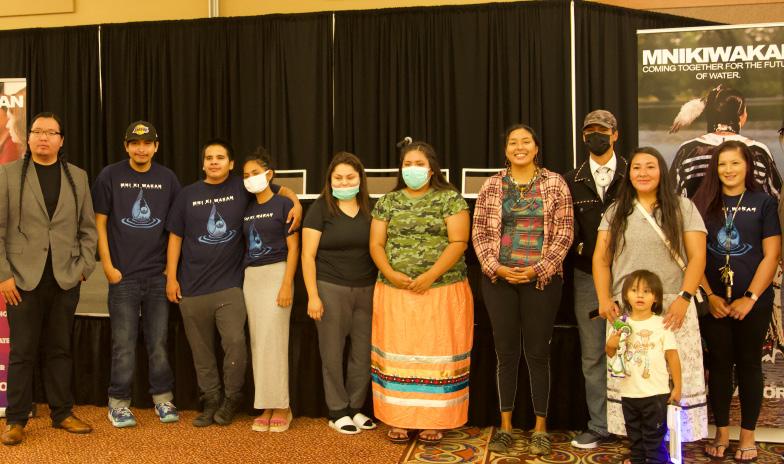
The summit gives elders and fluent speakers the opportunity to visit in their language, and allows learners and youth to engage with the language. In addition, the summit is also used to share teaching methods, technology, materials, and other resources for creating a successful language program.
The SMSC has donated $37,500 to Tusweca Tiospaye since 2012 to help sustain Lakota, Dakota, and Nakota language.
United National Indian Tribal Youth (UNITY) was founded in 1976 when J.R. Cook, an enrolled member of the Cherokee Nation, saw the need to create an organization to help Native youth realize their potential, express their voices on issues that matter to them, and give back to their communities through community service. In furthering its mission, UNITY has consistently developed and delivered quality services to the nation’s Native youth for the past 45 years.
$25000
The organization’s 25 Under 25 Native Youth Recognition Program recognizes and celebrates young Native people between the ages of 14 and 25 who, through their personal initiative and accomplishments, have made a difference. The honorees were recognized at the 2022 National UNITY Conference in Minneapolis, Minnesota. The nine-month program—the only one of its kind in the country—includes training opportunities throughout the year that include sessions on mentoring, media relations, healthy lifestyles, financial literacy, citizenship, community engagement, culture and resiliency, medicine wheel philosophy, and the power of vision.
UNITY’s affiliated youth councils involve thousands of Native American youths in rewarding, personal growth activities that prepare them for responsible citizenship, leadership, and employment while honoring and helping preserve their tribal languages, traditions, and cultural practices for future generations.
In 2022, the SMSC continued to provide funding for the 25 Under 25 Native Youth Recognition Program with a $25,000 donation to United National Indian Tribal Youth.
In July 2022, more than 350 Native women congregated at Foxwoods Resort Casino in Connecticut for the Women Empowering Women for Indigenous Nations (WEWIN) National Conference. Just over 18 years ago, WEWIN created this national conference to support its mission to engage, inspire, and empower Native women throughout Indian Country. The conference provides a forum for women to come together to discuss important issues faced by Native women and to celebrate those who have inspired both their communities and Indian Country as a whole.
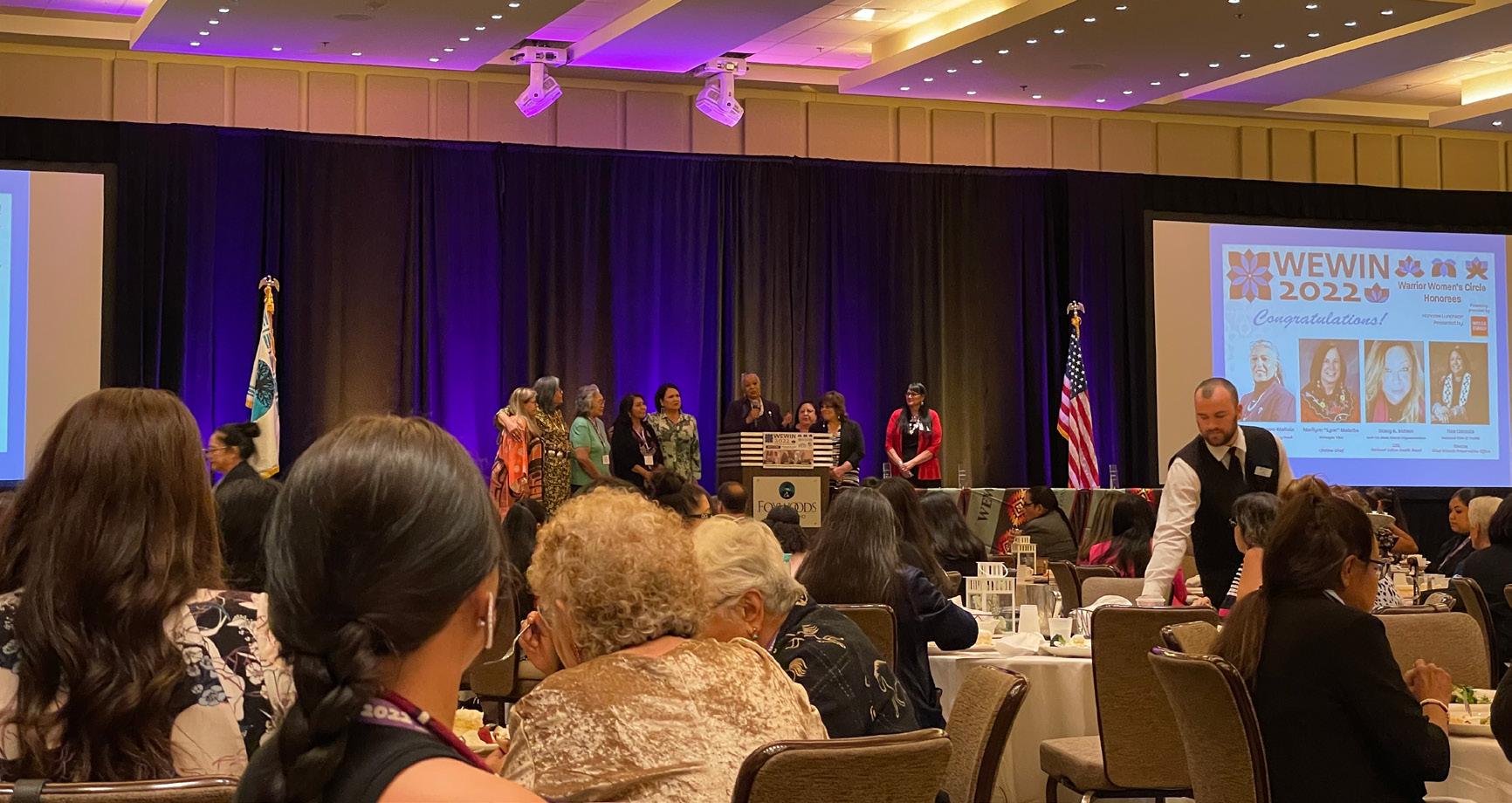
$25000
Thanks in part to a $25,000 sponsorship donation from the SMSC—the conference’s presenting sponsor since 2011—the three-day event helped create stronger networks, examine public policy, foster economic growth, and aid personal and professional development, all while giving attendees opportunities to connect, encourage, and support one another.



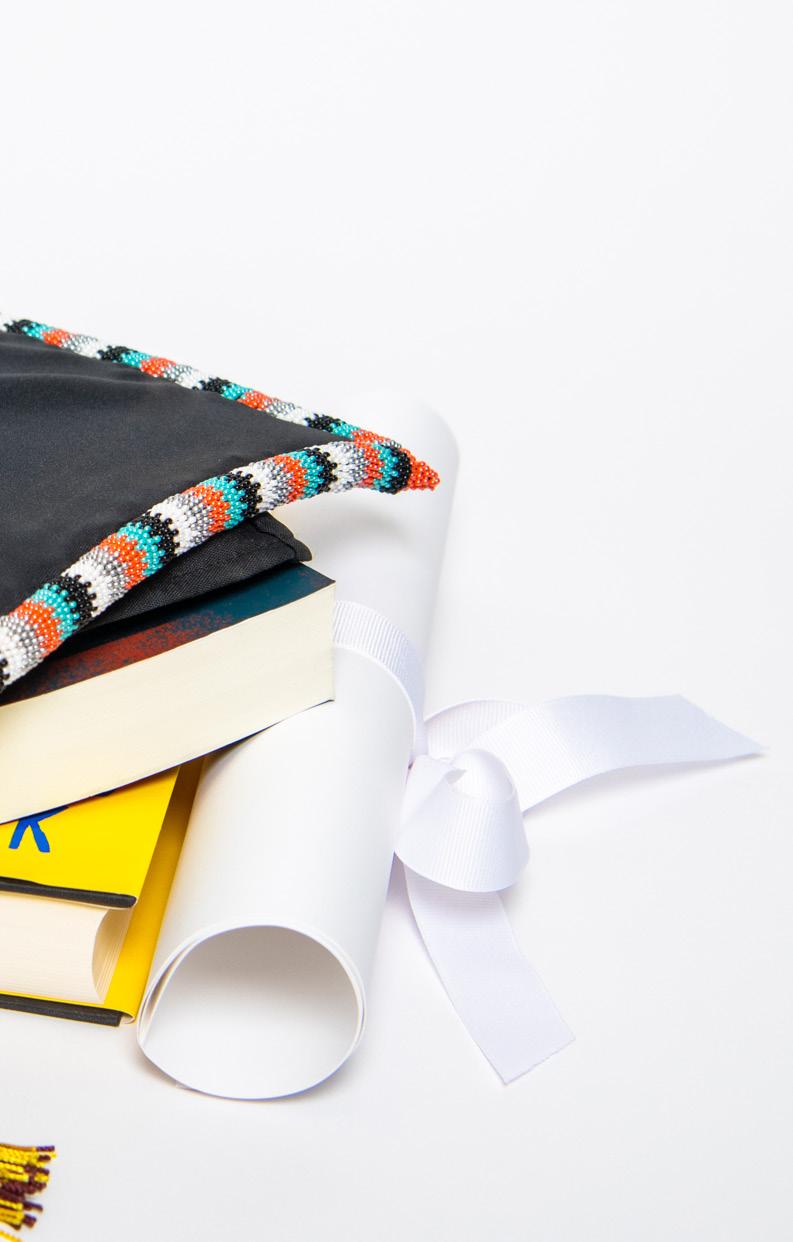
On the easternmost edge of the state, South Dakota State University (SDSU) is committed to providing access to higher education, supporting and creating knowledge and understanding, and continuously expanding the university’s impact and influence in the Great Plains region—especially for Native American students. Although young Native youth in South Dakota possess the intellect and desire to go to college, many of these students are the first in their families to attend a postsecondary institution and often do not have the necessary financial support or resources.
Recognizing the importance of education and championing today’s youth, the SMSC donated $500,000 to SDSU in fiscal year 2020—with specific funds designated for a new American Indian Student Center and student scholarships.
Located in the heart of the SDSU campus, the newly completed (as of July 2020) American Indian Student Center serves as an “educational home” for Native American

scholars. The facility provides office space, meeting rooms, multipurpose rooms, technology resources, student support space, and academic support space. Its primary function is ultimately dedicated to student support programming and services.
“Native American students need a space to feel welcomed, feel accepted, and feel loved, and this space allows that,” said Erica Moore, director of the American Indian Student Center. “It’s also the place to go for academic and retention advising, to enjoy cultural programming, and connect with other Native students.”
Aesthetically, inspiration for the building’s exterior materials and finishes came from the state’s landscape—vertical elements represent prairie grasses, glazing panels represent the Missouri River, and masonry outcroppings represent the Badlands. Inside, students can use an intimate multipurpose area to practice their drumming or singing, seek counsel from an elder, or come together in small groups. The names of the original Seven Council Fires of the Oceti Ṡakowiŋ, engraved on wood planks, encircle the room.
“The new center will create opportunities and support for thousands of Native American students to receive the benefits of higher education, while connecting the rest of our campus to the culture and values of the Indigenous people of our state and region,” said SDSU President Barry Dunn, an enrolled member of the Rosebud Sioux Tribe. “Many of our students will experience the center through classes taught in the building and other events designed to explore and learn. The work of the SDSU Foundation and our donors has transformed our university and created a strong pathway for our Native American students to be successful.”
In addition, to help alleviate some of the financial hardships often associated with attending college, scholarships have been
made available through SDSU’s Wokini Initiative. In Lakota, the word wokini means “new life” or “a new beginning.” The goal of this initiative is to collaborate and partner with local tribes and tribal schools to increase access to SDSU’s many educational and advancement opportunities for Native Americans.
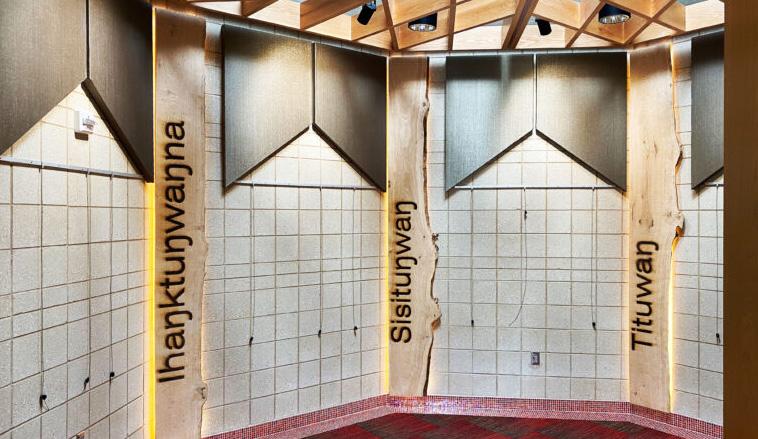
For up to five years, each Wokini scholar will be given the resources and have access to academic, personal, health, and financial wellness knowledge to succeed. The hope is that Wokini scholars, like previous Native American SDSU graduates, will remain active in their reservations and local communities, strengthening and bolstering the state’s social and economic structures. Equally important, Wokini scholars will serve as role models, empowering future generations to follow the same path to college graduation and beyond.
South Dakota State University (SDSU) is a place where Native American students achieve their dreams and aspirations, and as an institution, SDSU promotes healthy, synergistic, sustained relationships with the tribal communities of South Dakota.
EXTERIOR: The Needles of the Black Hills formations are represented by narrow, vertical brick patterns in light hues against a darker brick background.
MULTIPURPOSE ROOM: An octagonal multipurpose room is clad in reflective metal tiles, in which the colors depict a rising fire against a blue sky.
LOBBY: In the student center’s lobby, the nine tribal flags of South Dakota are proudly displayed, along with murals and original art pieces from local Indigenous artists.
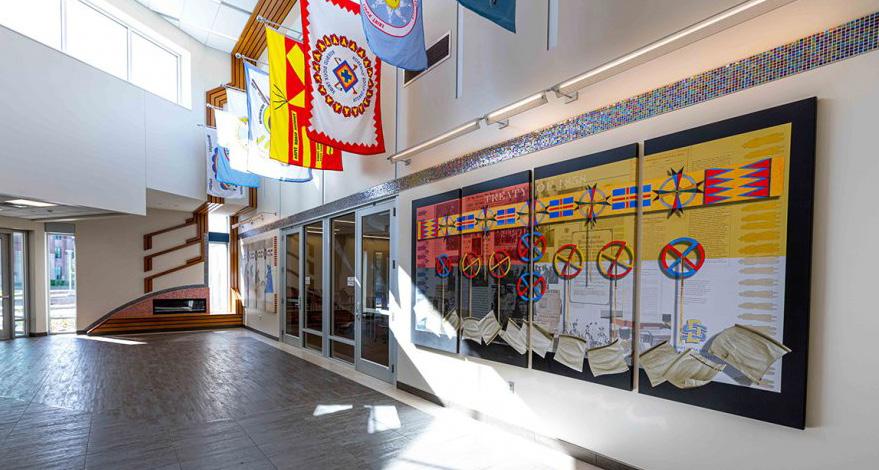
Each year, the SMSC funds several educational initiatives, including an endowed scholarship fund at the University of Minnesota. Established through a $2.5 million donation in 2009, the SMSC Endowed Scholarship program supports talented Native American students with financial needs who are seeking undergraduate and graduate degrees from the University of Minnesota. The SMSC has donated more than $5 million overall to support the program.
In recognition of the program’s 10th year, and to extend support to scholarship recipients after graduation, an alumni program was created for SMSC scholars who received their education at the University of Minnesota. The kickoff event took place in February 2020 at the SMSC’s Mystic Lake Center in Prior Lake, Minnesota, where dozens of scholars gathered for networking, dinner, and conversation. The reunion event
featured a keynote from Native author Edgar Villanueva, who discussed his book Decolonizing Wealth: Indigenous Wisdom to Heal Divides and Restore Balance. Scholars were also able to engage in a question-and-answer session with Villanueva during the event. The alumni program represents the SMSC’s latest effort to ensure that Native students receive the support they need to succeed—both academically and professionally.
“The endowment will provide opportunities for more Indian students to seek out a college education at the university so that they can better serve their tribal communities,” the late SMSC Chairman Stanley R. Crooks said in 2007 at an inaugural ceremony. Since its inception, more than 200 students have received this scholarship, representing more than 40 tribal nations.
Thank you for your outstanding commitment to student scholarships at the University of Minnesota. Because of your generosity, our talented, curious, and driven students are able to participate fully in university life, developing their skills in classrooms, labs, libraries, and studios. These scholars will become tomorrow’s leaders—thanks to you.
– CHIEF DEVELOPMENT OFFICER, UNIVERSITY-WIDE SCHOLARSHIPS MICHELLE LIAN-ANDERSONSUPPORTING DAKOTA LANGUAGE EDUCATION
Language is a very important component of Dakota heritage and can have a lasting impact on the way the Dakota culture is honored and preserved for future generations. This is why the Lower Sioux Indian Community established C̣aƞṡayapi Waḳaƞyeża Owayawa Oṭi (CWOO) Early Head Start and Head Start programs in 2018. Part of a Dakota Language Immersion School, these programs focus heavily on cultivating the next generations of Dakota language speakers.
$5000
In fiscal year 2021, the SMSC donated $5,000 for the coordination of the first annual CWOO Golf Tournament Fundraiser that was held on June 24, 2021, at the Dacotah Ridge Golf Course in Morton, Minnesota. All proceeds from the tournament directly supported the CWOO Birth to 5-YearOld Immersion School and the launch of a capital campaign for future school development.
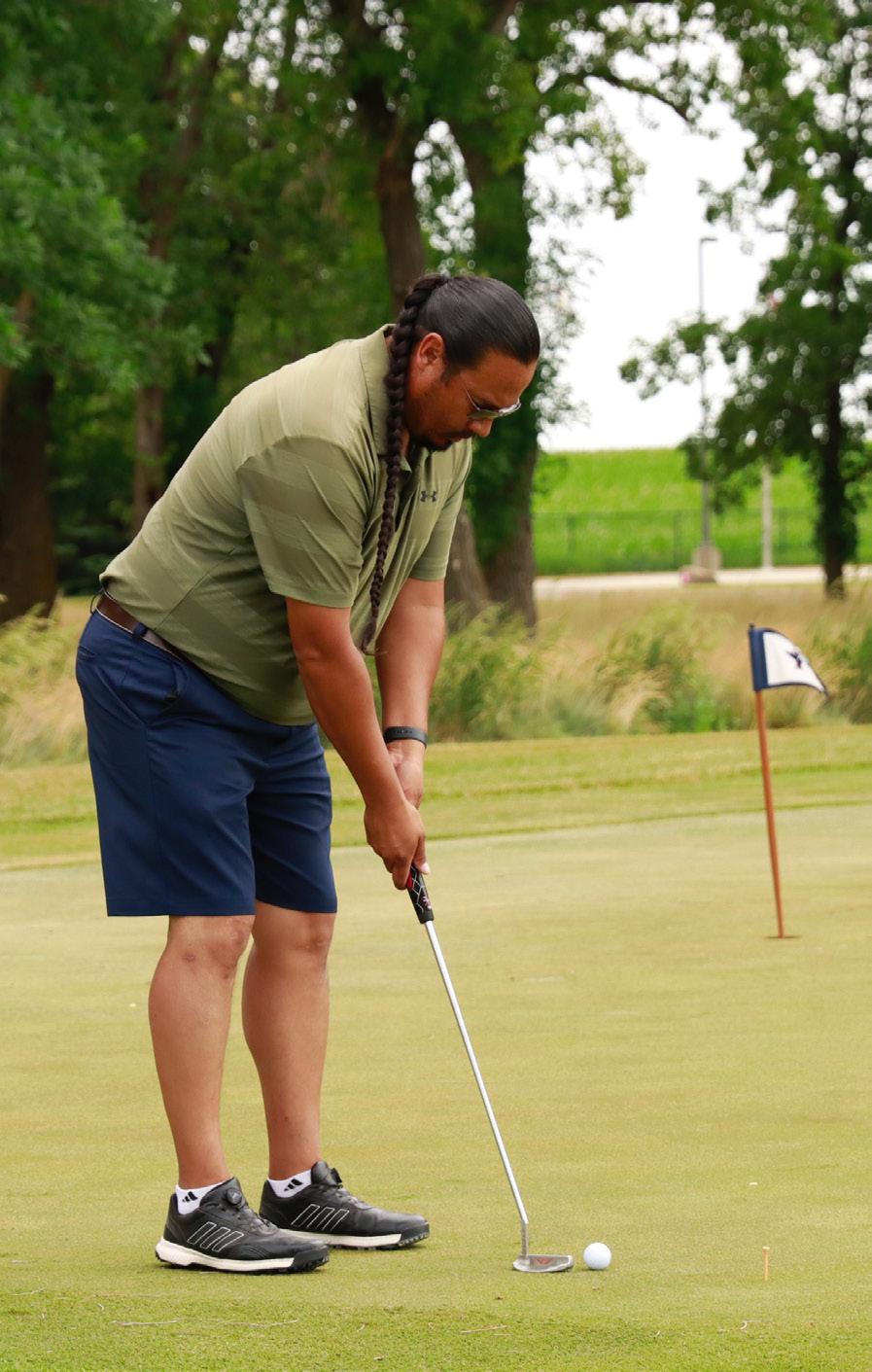
Programs like these are shining examples of what it means to plan seven generations ahead. Furthermore, they set youth up for success in stewardship of Dakota values.

CHANGING
Understand Native Minnesota, a $5 million strategic initiative and philanthropic campaign aimed at strengthening the Native American narrative in Minnesota schools, was first launched by the SMSC in October 2019.

SMSC Secretary/Treasurer Rebecca Crooks-Stratton leads the campaign and works tirelessly to develop partnerships with educators, authors, civic groups, elected officials, local governments, and other organizations across the state and country. Some strategic partners of the campaign include the Minnesota Indian Education Association, Education Minnesota, Bell Museum, and the Native Governance Center.
The campaign has worked diligently to incorporate greater awareness of Native Americans, along with accurate information about their history, culture, and modern businesses and tribal governments into Minnesota’s K-12
education system. Programming has included listening sessions with Minnesota educators, a podcast series that highlights strong voices of Native and non-Native allies, meetings with various education associations and other groups, cultivating a resource scan that will help improve classroom resources and curriculum, and hosting an educational exhibit at the Minnesota State Fair in 2021— making the SMSC the first tribal government represented at the fair since its inception more than 160 years ago!
While this campaign is intended to make a positive impact throughout the state, the SMSC is especially interested in working close to home. In September 2021, the campaign hosted Scott County education leaders for a listening and discussion session on Native American narrative change work in local schools. This session brought more than 30 education leaders—including teachers, superintendents, curriculum and
professional development staff, and school board members— to learn more about Understand Native Minnesota and share Native narrative change successes and problems in their school districts.
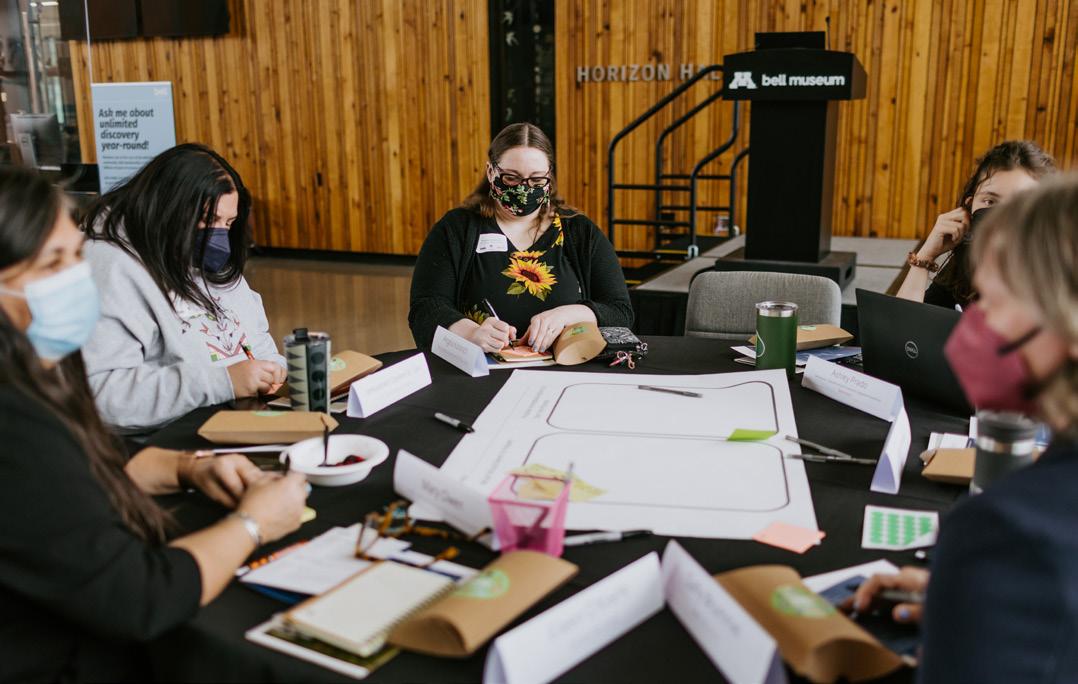
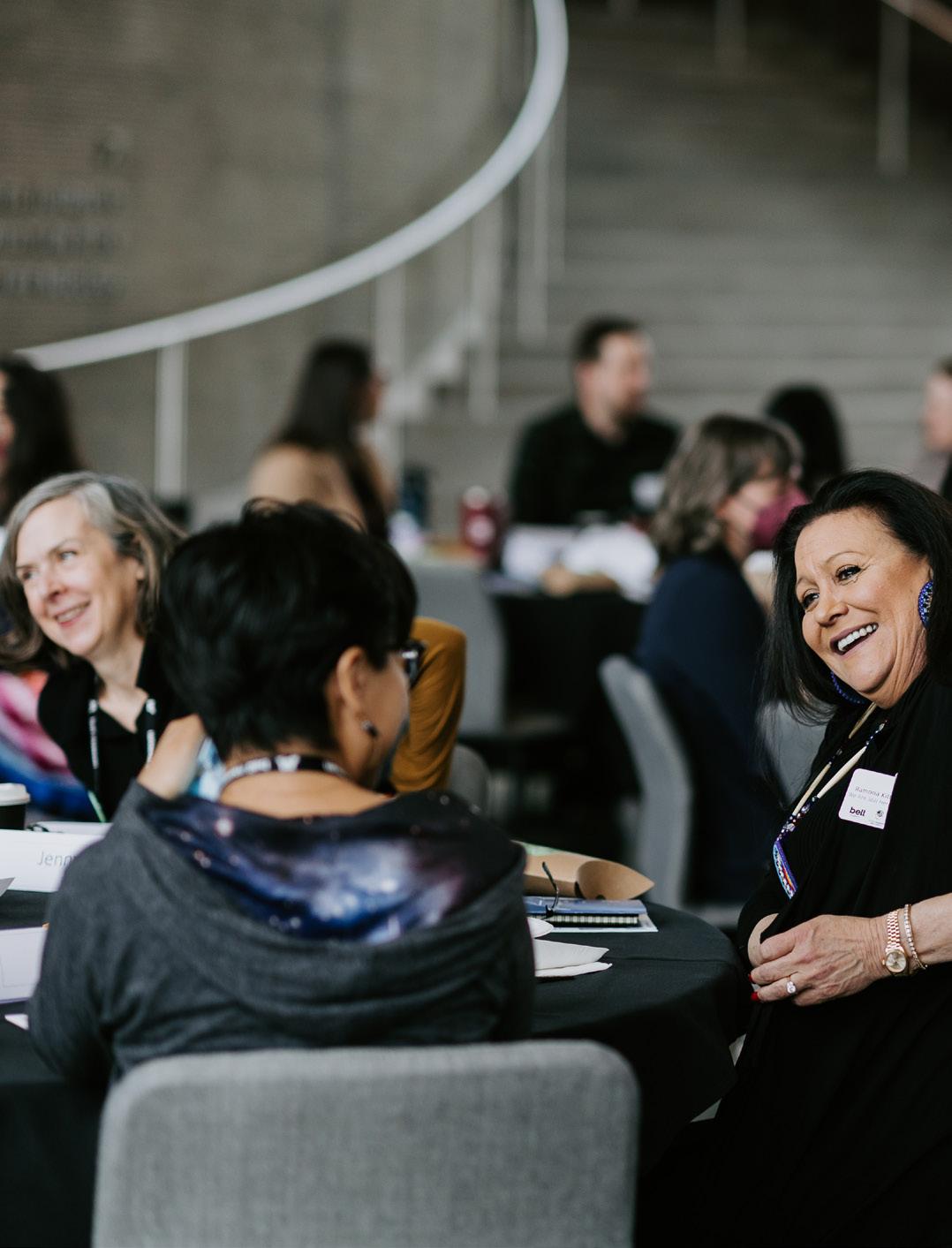

Led by Secretary/Treasurer Crooks-Stratton, the afternoon featured an encouraging discussion. Many participants committed to taking immediate steps to improve how they incorporate Native American subject matter and culture into their school settings. The hope is that this listening session can serve as a model for similar convenings across the state.
I think understanding more about people in our communities and the differences—but also the similarities—is really important. Seeing yourself reflected in your education and your curriculum, and how your story fits in the larger community is so important for all of our children.
To learn more about Understand Native Minnesota, listen to the Native Minnesota podcast, and sign up for updates from the campaign at UnderstandNativeMN.org

The Indian Gaming and Tribal SelfGovernance (IGG) Programs at the Sandra Day O’Connor College of Law at Arizona State University (ASU) were established in 2020 as the first and only master’s degree programs in Indian gaming and tribal self-governance. These programs have developed a robust online curriculum that includes classes on Indian gaming, tribal self-governance, civil jurisdiction in Indian Country, and American Indian law. The SMSC contributed $25,000 in 2021 to support these programs and course development.
$25000
The IGG Programs aim to help further the understanding of critical aspects of Indian gaming and self-governance and bolster the resumes and professional acumen of its students–the overwhelming majority of whom come from tribal communities. To support its students, the IGG Programs are also developing a Tribal Self-Governance Post-Graduate Fellowship Program and a Tribal Self-Governance Externship Program. These programs will help students gain practical experience working for and on behalf of tribal governments and will assist them in starting careers dedicated to service in Indian Country. Graduates may serve as senior or mid-level executives for tribes or tribal entities, tribal elected officials responsible for overseeing these aspects of their tribal operations, and other professionals with careers such as congressional staff and federal, state, and local employees.
To welcome support of higher education, Leech Lake Tribal College (LLTC) hosted its 15th Annual Golf Classic on June 23, 2021, with a gift of $5,000 from the SMSC to sponsor the event. A team made up of SMSC Members and their invited guests participated in the tournament that was held at Tianna Country Club in Walker, Minnesota.
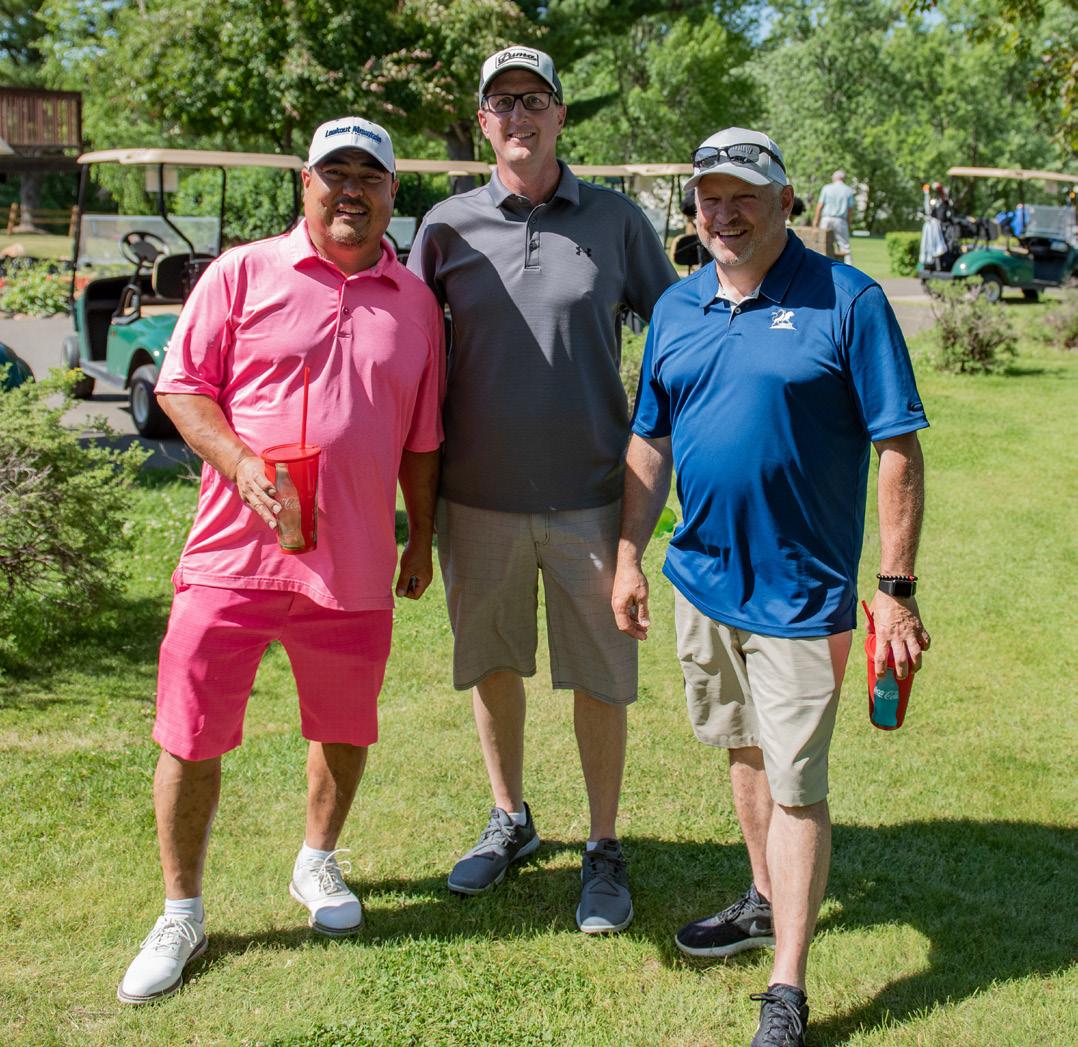
$5000
Academy of Whole Learning is a nonprofit school for students with autism spectrum disorder (ASD) or related learning differences, founded by parents seeking a different educational opportunity for children struggling to succeed in traditional school settings.
$25000
In 2021, the SMSC donated $25,000 to Academy of Whole Learning to provide tuition assistance for families, allowing for more students to succeed and flourish using the holistic and complete school program. By understanding and supporting each student’s neurological, physical, social, and emotional needs, the school provides a positive and unique educational environment, one that encourages students to participate and enjoy learning.
Academy of Whole Learning is a unique school, the only one in the Twin Cities area, and one of only a handful that specializes in educating high-functioning students with ASD or related learning differences in the world.
Proceeds from this event go to support LLTC student events, the LLTC Endowment, and the Leech Lake Education Endowment—all of which support their mission to “provide quality higher education grounded in Anishinaabe values.”
Academy of Whole Learning’s mission is to provide personalized learning paths, integrated social, academic, and life skills for students with autism spectrum disorder and individual learning needs.
SUPPORTING
UTTC TRIBAL LEADERS SUMMIT AND POWWOW
For 50 years, United Tribes Technical College (UTTC) in Bismarck, North Dakota, has served over 10,000 American Indian students from more than 75 federally recognized Indian tribes across the nation.
Each fall, the school hosts the UTTC Events Week—a cultural celebration and learning opportunity for Native American and non-Native cultures—including a tribal leaders summit, powwow, and several athletic competitions. These events draw an estimated 10,000 people to UTTC and generate an economic impact of $4.2 million to the local community.
Additionally, UTTC Events Week directly benefits and develops future leaders with an average of $50,000 per year being provided to students from the profits the events generate.
In 2022, the SMSC contributed $10,000 to the event, directed toward the tribal leaders summit and international powwow.
United Tribal Technical College provides quality postsecondary education and training to enhance knowledge, diversity, and leadership for all Indigenous nations.
United Tribal Technical College strives to build cultural, educated, and healthy leaders who empower and serve their communities.
Over the years, the SMSC has been the recipient of Johnson O’Malley funds, a federal grant for Native American students that helps with educational expenses. The main requirement of this program is that the student needs to either be enrolled in a federally recognized tribe or meet the blood quantum of 1/4 degree or more, as per the Bureau of Indian Affairs guidelines. Due to these requirements, students were being turned away from the program.
$60000
In 2022, the SMSC contributed $60,000 to create the Wóuŋspe Program (Education Program) for Scott County Native students that do not meet the BIA guidelines. The new program mimics the Johnson O’Malley program, except for the blood quantum or enrollment, by helping students and their families with educational costs such as school supplies, school fees, and more.
Recognizing that their children did not have an educational choice that encouraged them to fully embrace who they are as Anishanaabe people and speakers of the Ojibwe language, the Red Lake Nation plans to Indigenize its educational system through the newly approved Endazhi-Nitaawiging Red Lake Charter School.
$1000000
Meaning “the place where it grows,” the school began construction in March 2022 with an estimated completion date of January 2023, thanks in part to a $1 million contribution from the SMSC.
The school will serve kindergarten through eighth grade students, their families, and the greater community with a goal of fostering academic excellence, educational curiosity, and a deep understanding of Ojibwe language and cultural values among students, so they may grow up to contribute to the revitalization and prosperity of the Red Lake Nation. With nearly 30,000 square feet of space, the project will include 13 classrooms, six core spaces (library, cafeteria, etc.) and additional support spaces. The school will also serve as a place for tribal members to take part in ceremonies and
community events while many of the ceremonial structures will be constructed by students, teachers, and community members working together using Indigenous architecture and building methods.
Additionally, the Red Lake Nation contains lands of rich biological diversity, thick forest, aquatic ecosystems, and many wildlife species, which will allow vast outdoor space for land-based exploration and experiential learning.
By providing a nurturing, supportive Indigenous education, the Endazhi-Nitaawiging Red Lake Charter School will improve economic, health, and general life outcomes for the children and families of the Red Lake Nation.

To prepare each student for college with an enhanced knowledge of the Ojibwe language, culture, language, leadership, and environmental stewardship.
To create confident leaders grounded in their true inherent identities and to ensure that they are academically, socially, and spiritually prepared to positive change the community and world.
Greater Twin Cities United Way recognizes education as one of the best ways to reduce disparities and put more households on the path to stability and economic security. Each year, more than 100,000 students in the Twin Cities area go back to school without a backpack and the essential supplies needed to learn and succeed in the classroom.
$20000
To address this issue, United Way has been teaming up with all seven of Minnesota’s professional sports teams and other local organizations since 2016 to bring volunteers together at Action Day to fill backpacks with school supplies, helping local students start the school year ready to learn.
Due to safety concerns in 2020, Greater Twin Cities United Way hosted a virtual Action Day, and backpacks were packed
remotely and distributed to students through various volunteers across the Twin Cities metro area. The SMSC teamed up with United Way to support the distribution of backpacks to local children in need.
The initiative has continued in 2021 and 2022, with the SMSC packing 1,000 backpacks each year for children in need to be distributed at the SMSC Wacipi—the SMSC’s largest event of the year.
Through this partnership, Community Members, Community Youth, team members, and employees have helped distribute 4,500 backpacks to local Indian education programs and the communities of Prior Lake and Shakopee over the last three years while the SMSC also contributed $20,000 to Greater Twin Cities United Way’s Action Day in 2022, supporting an event that resulted in 4,000 volunteers packing and distributing over 54,000 backpacks for children in need.
It’s inspiring to see so many people come together for an important cause. We appreciate everyone who volunteered their time for an initiative that the entire Community can be proud of.
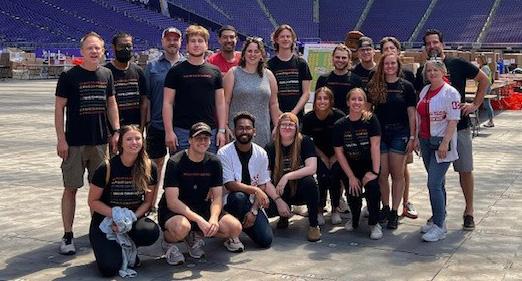

SMSC MEMBER AND DAKOTA KINSHIP FACILITATOR
KRISTINA ZANDER





Native American youth face some of the largest health, socioeconomic, and educational disparities of any racial or ethnic group in the country today. To help promote the well-being of tribal members and to fight nutrition-related diseases such as obesity and diabetes, Johns Hopkins Center for American Indian Health (JHCAIH) partners with Native American communities to provide programs such as NativeVision and Together on Diabetes. In support of the values and goals of these programs, and the important work that JHCAIH does, the SMSC provided the organization with a $500,000 grant in 2020.
NativeVision is a unique youth enrichment and empowerment initiative that launched in 1996 and has helped more than 40,000 Native youth and tribal community members from dozens of tribes across the country. The program enhances participants’ knowledge about nutrition, fitness, and life skills; increases physical activity; decreases sugary beverage consumption; and increases water consumption. The SMSC’s
grant will help fund the equipment, supplies, training materials, and follow-up technical assistance necessary to further scale NativeVision to additional tribal communities across the country.
Together on Diabetes focuses on preventing and reducing obesity and diabetes through family and cultural practices that encourage a healthy diet and physical activities. The program also promotes resources for coping with stress and helps reconnect families through an intergenerational homebased curriculum taught by Indigenous family health coaches. Funds from the SMSC will be used to support community research advisory councils in each of the participating communities to guide the project, additional family health coaches to deliver the program, and partial support for the program team.
MISSION:
Johns Hopkins Center for American Indian Health works in partnership with American Indian and Alaska Native communities to improve the health status, self-sufficiency, and health leadership of Native people.
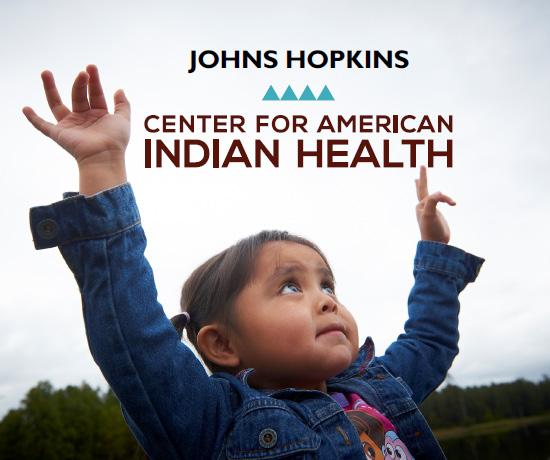
Operated by the Lac Vieux Desert Band of Lake Superior Chippewa Indians, the Lac Vieux Desert Health Center (LVDHC) offers a wide variety of primary care services for patients of all ages, including dental care, optometry, chiropractic, behavioral health, and tribal home visits to support strong families. Its primary care providers specialize in family medicine.
$300 000
The SMSC’s Tribal Public Health (TPH) provides a wide range of services, screenings, and procedures. Since the outset of the COVID-19 pandemic, TPH has worked tirelessly to put new procedures in place and share critical information to help keep Community Members, employees, and visitors to the SMSC’s enterprises safe and healthy. Mitigation efforts include implementing daily employee health screenings, offering COVID-19 testing, and providing health and safety guidance for events.
In addition to offering the COVID-19 vaccine to Community Members, employees, and their dependents, the SMSC hosted vaccination clinics in partnership with the Scott County Health Department in 2021. The Scott County Health Department utilized the SMSC Mobile Unit as a traveling COVID-19 vaccination clinic at the Scott County Fair for anyone interested in receiving a dose of the vaccine. The Mobile Unit was also used at the 2021 SMSC Wacipi to provide testing and vaccinations.
Thanks in part to a $300,000 grant from the SMSC, LVDHC expanded its care into the Eagle River, Wisconsin, area through a new satellite clinic. The Lac Vieux Desert Satellite Clinic opened its doors to the public in February 2020, offering primary care, walk-in, and same-day services. Staffed by providers that are local to the area, the new clinic has allowed LVDHC to expand its health care delivery area and provider base.

The vaccines currently available have been very effective at minimizing the risk of getting COVID-19 and preventing serious illness if a person does become infected with the virus. We were glad to be able to provide our neighbors with the opportunity to protect themselves and their loved ones—our biggest priority is making sure people in our Community and in the surrounding area stay healthy and safe.
– MANAGER OF TRIBAL PUBLIC HEALTH KRISTEN MILESWith a growing community comes a rise in demand for health care in the Shakopee area. Driven to provide high-quality, compassionate care to heal the mind, body, and spirit of each patient, St. Francis Regional Medical Center launched a $5 million capital campaign in 2020. To address some of the fastest growing and most critical needs of patients, the hospital’s primary focus is to expand and transform the Emergency Department and Cancer Center with these funds. To launch this promising and meaningful initiative, the SMSC gifted $1 million to the organization in 2020.
Thanks in part to the SMSC’s contribution, St. Francis Regional Medical Center will be able to double the capacity of both the Emergency Department and Cancer Center, two crucial components of the hospital. The Emergency Department expansion features 14 additional emergency rooms, two trauma rooms, and a four-room emergency mental health suite that can expand to six rooms. The Cancer Center project will renovate
existing space to increase the number of oncology exam rooms from four to eight, and expand and remodel the infusion area to allow for additional infusion chairs. St. Francis Regional Medical Center broke ground on the expansion in May 2021.
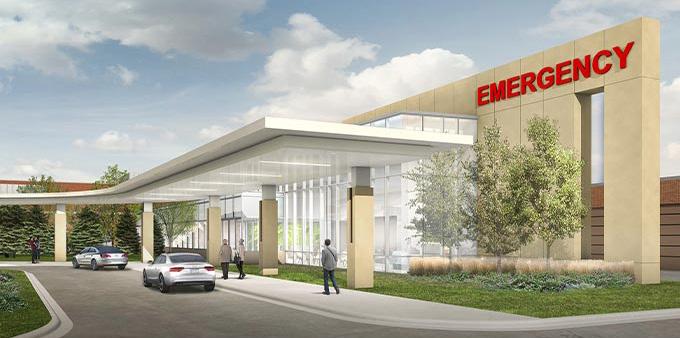
The SMSC has been a longtime supporter of the Saints Foundation, which brings together the fundraising efforts of two nonprofit health care organizations—St. Francis Regional Medical Center and St. Gertrude’s Health and Rehabilitation Center. Since 1990, the SMSC has provided more than $3.3 million in support to the Saints Foundation to help advance the future of health care and support the organization’s mission to raise hope and change lives.
It is difficult to put into words what your support has meant to our hospital. You have been by our side for years, helping us care for our community.
– ST. FRANCIS REGIONAL MEDICAL CENTER PRESIDENT AMY JERDEEFounded in 1982 as a nonprofit, Make-A-Wish Minnesota has granted more than 6,000 wishes to children with critical illnesses in the state. These wishes vary from child to child and can include meeting a sports hero or going on an allinclusive trip.
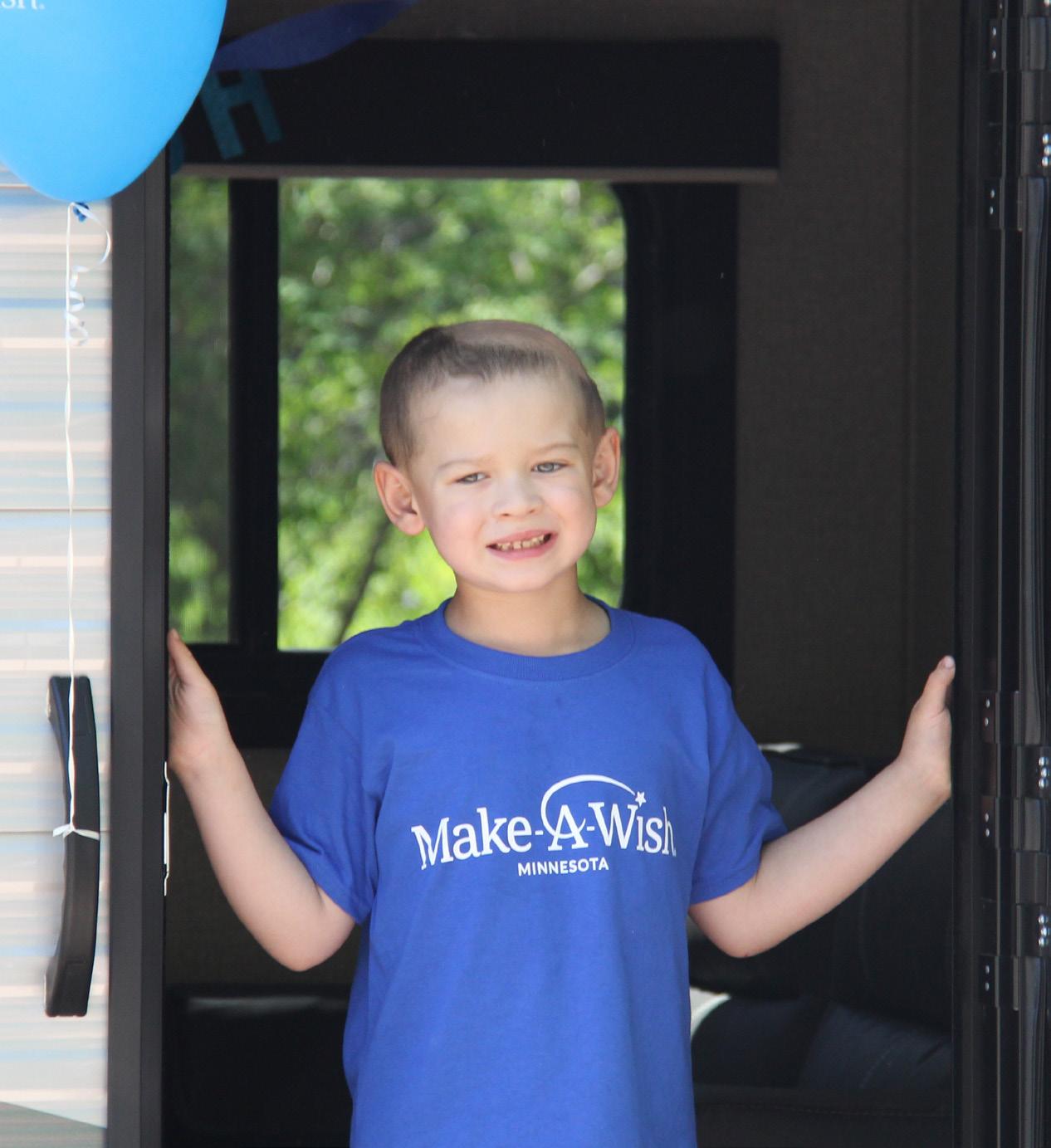
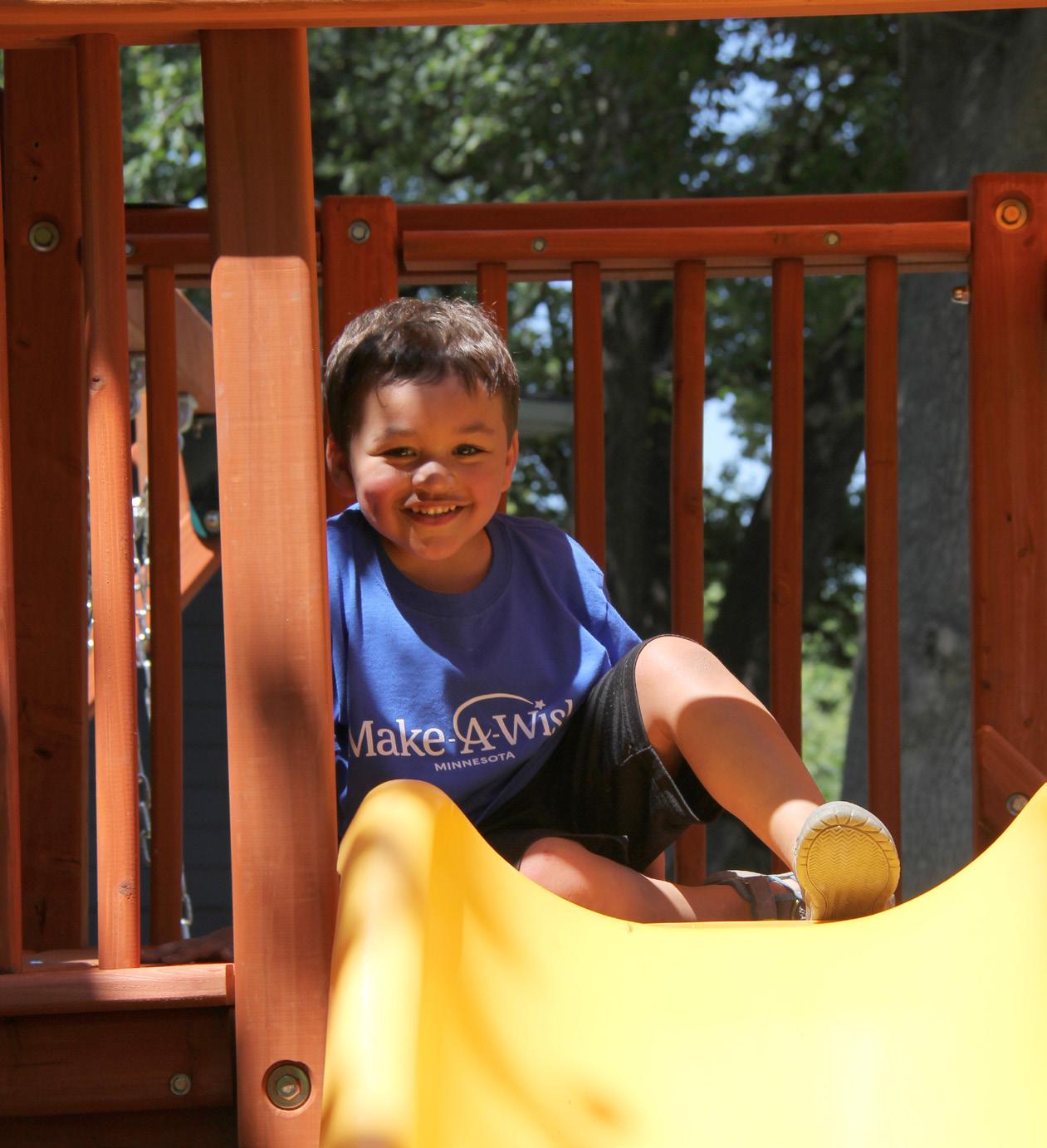
$180 000
As a sponsor of Make-A-Wish, the SMSC hosted the organization’s 2019 Wish Ball at Mystic Lake Center. Between ticket sales, in-kind donations, and an auction, Make-A-Wish raised over $1 million, a record-breaking amount, which helped grant between 250 and 300 wishes.
Like many events across the country over the past year and a half, developments in health and safety protocols made it difficult to gather in person, so Make-A-Wish organized virtual
Wish Balls in 2020 and 2021. With no ticket sales from the events, Make-A-Wish relied heavily on donations and online auction participation.
To boost the goals of these online events, the SMSC donated $50,000 toward the 2020 and 2021 Wish Balls, along with $30,000 in additional in-kind donations in 2020 to add to their support of Make-A-Wish’s mission. Even without in-person attendance, Make-A-Wish still found great success in the online auctions and was ultimately able to grant life-changing wishes to deserving children. The Gala returned to in person for 2022, with The SMSC contributing $50,000.
Looking ahead, Make-A-Wish is hopeful that the annual gala will take place in person again and the SMSC has already offered a space at Mystic Lake Center for the 2023 Wish Ball, set for April 29.
PROVIDING LIFESAVING EQUIPMENT NEAR AND FAR
Sudden cardiac arrest can happen to anyone, of any age, at any time, and having access to an automated external defibrillator (AED) can drastically help those experiencing a life-threatening episode. The easy-to-use medical device may not look like much, but it can analyze the heart’s rhythm and, if necessary, deliver lifesaving assistance. The SMSC is proud to provide these devices to organizations both near and far.
The Cowlitz Indian Tribe is a federally recognized tribe that serves over 4,369 tribal members. The tribe’s Public Safety Department provides lifesaving services to tribal members and members of the public who may need them while on the reservation in southwest Washington.

In 2021, the Cowlitz Indian Tribe Public Safety Department reached out to the SMSC in need of AED devices to be placed throughout the community and in emergency vehicles. The SMSC responded to the need with an in-kind donation of 10 AEDs. The tribe’s Public Safety Department will now have the ability to promptly access the devices in the event of a lifethreatening emergency.
The Prior Lake Fire Department (PLFD) was established in 1916 and is currently staffed by volunteers. In 2022, the PLFD consisted of 37 paid-on-call firefighters, a full-time fire chief, and full-time assistant fire chief. With two stations in operation, the PLFD is committed to providing the highest
quality emergency response, fire suppression, and fire prevention education to the city of Prior Lake, the city of Credit River, and Spring Lake Township, while maintaining environmental preservation.
Previously, the SMSC supplied AEDs as a grant to the PLFD. After being used on numerous occasions and approaching replacement, the SMSC once again provided the PLFD with eight new AEDs in 2022, which are housed on fire apparatuses including four chief vehicles, two rescue trucks, and two rescue engines.
360 Communities
FOUR AED DEVICES
360 Communities, a multi-faceted human services organization, delivers safety and stability to those facing challenges through resource centers, food shelves, and housing shelters. The organization serves a high volume of clients ranging from infants to senior citizens throughout the state of Minnesota. With a mission to deliver safety and stability that improves lives, 360 Communities was in need of lifesaving devices at all four of its locations to assist in the event of a cardiac arrest.
In 2022, the SMSC made an in-kind donation of four AEDs to be placed at 360 Communities’ two family resource centers and food shelves in Burnsville and Rosemount and its two domestic violence shelters located in Eagan and Hastings. The gift of these AEDs will provide reassurance to 360 Communities’ clients for years to come.
When an individual is recovering from addiction of any kind, it is imperative that they have both support and resources that are readily available to them. Founded in 1970, Project Turnabout offers inpatient and outpatient treatment and recovery services for individuals affected by substance use and other addiction disorders. The nonprofit’s 131-bed main campus is located in Granite Falls, Minnesota, with outpatient offices in Wilmar, Marshall, and Redwood Falls, Minnesota.
$45553
With the help of donors like the SMSC, Project Turnabout is now in the final phases of a campus improvement project to include comprehensive step-down services for addiction recovery. The initial phase of the building project, which was completed in November 2021 at the Wilmar campus, added a 16-bed licensed residential program for women as well as outpatient services for men and women. The project also added transitional living apartments to help support vocational and educational pursuits through sober living.
The current phase of the development, in which the SMSC has committed to supporting, will consist of installing the campus’ safety and security features, such as landscaping, lighting, privacy fencing, secured access systems, and related items.
The facilities collectively employ more than 180 full- and part-time staff members, including registered nurses, licensed mental health professionals, licensed drug and alcohol counselors (LADC), licensed admissions staff, an LADC recreation therapist, a chaplain, and volunteers.
Since 1999, the SMSC has assisted in funding various improvements to Project Turnabout’s facilities and has contributed to multiple fundraising events—collectively totaling more than $500,000.
$27500
We Are Healers is a 501c3 nonprofit organization which aims to increase Native Americans in the health care industry. With a mission for helping American Indian youth see themselves as future healers, the organization incorporates the stories of Native role models and encourages youth to harness the strength of their tribal healing traditions as they explore educational opportunities.
According to Indian Country Today, only 0.17% of American Indians and Alaskan Natives were MD-granting medical school matriculants. We Are Healers is helping to change this narrative by helping Native youth pursue careers in medicine, connecting them to resources, and advising academic health institutions on how to recruit and retain Native American students.
We Are Healers has partnered with Northwest Native American Center of Excellence, as well as Northwest Portland Area Indian Health Board to develop a mentoring software that connects students to health professionals and implements digital stories that are used in a virtual health careers curriculum. This software creates a mechanism of organic guidance where students receive mentoring on their pathway to health care careers.
With $27,500 in support provided by the SMSC, We Are Healers will be able to improve the resources available to Native American students on their path toward a health care career and expand the targeted audience for their programming. Financial support is also available through the organization to help fund the cost of standardized testing (MCAT, USMLE, Test Prep, etc.).
While health care disparities exist in Native communities and there are too few Native health providers, We Are Healers is dismantling invisibility and racism, while ensuring a better present and future for Native people.
UPGRADING EMERGENCY SERVICES
$5000
The National Indian Child Welfare Association (NICWA) is dedicated to ensuring Native children have access to community-based, culturally appropriate services that help them grow up safe, healthy, and spiritually strong. The Nativeled organization supports tribes in building capacity to prevent child abuse and neglect through positive systems change at the state, federal, and tribal levels.
Each year, NICWA hosts its Protecting Our Children national conference to address the needs of American Indian and Alaska Native children. In April 2022, for its 40th year, NICWA’s conference brought together diverse and influential stakeholders from all over the country for four days of networking and learning opportunities. As the largest national gathering on American Indian and Alaska Native child advocacy issues, the conference saw more than 1,200 attendees representing more than 200 tribes.
The SMSC’s continued sponsorship of the conference— totaling more than $31,000 since 2008—helps allow frontline tribal child welfare and behavioral health workers to receive practical, timely, and culturally relevant information to take home to their communities.
$10000
It is important to have access to quality emergency care when the unimaginable happens. If a hospital’s emergency department is ill-equipped or outdated, the level of care may suffer. This is why regular upgrades and enhancements to emergency care facilities are crucial to ensuring the highest level of care is provided for the well-being of the patients seeking help.
In 2022, Hennepin Healthcare Foundation recognized a need to upgrade its emergency department at its Level I Verified Adult and Pediatric Trauma Center. Located in Minneapolis, Hennepin County Medical Center (HCMC) acts as the community’s “safety net hospital,” meaning they won’t turn away patients who cannot cover their expenses. Facilities like HCMC play an important role in providing accessible, quality healthcare for all, which resonates with the SMSC’s mission of being a good neighbor.
The Hennepin Healthcare Foundation’s capital request came at a time when the system hoped to expand access, safety, and quality through its physical environment and health services for pediatric patients who visit the emergency department. The previous space was shared between adult and pediatric patients, which caused a challenging environment for children to receive necessary critical care. The SMSC responded to the request with a $10,000 donation, bringing the tribe’s total award history to the foundation to $64,000 since 1995. With the SMSC’s support, the hospital was able to create a dedicated healing space for pediatric patients and their family members.
Food sovereignty and self-sufficiency strengthens tribal sovereignty. For years, members of the SMSC community have gained nutritional and health benefits from the organic fruits, herbs, and vegetables SMSC grows at its Wozupi Tribal Gardens and that it sells at its Mazopiya natural food market. Promoting locally grown and culturally appropriate food is central to our cultural recovery. In the Dakota tradition, we seek to share with other Tribes what we have found is good for our tribal community. That’s why SMSC helped found the Native Farm Bill Coalition, a group of over 150 Tribes and tribal organizations that measurably improved the national 2018 Farm Bill for all of Indian Country. And it is why SMSC is once again providing substantial financial and technical support to this Coalition as we gear up to dramatically enhance how the 2023 Farm Bill will assist Indian Country for the next five years.

The SMSC Community has also found that improved nutrition improves our health, and in our Dakota tradition of sharing, that means we have supported efforts to improve nutrition throughout Indian Country through our Seeds of Native Health initiatives. Working with strategic partners, and hundreds of thousands of dollars in SMSC contributions over the past decade, Seeds of Native Health has improved awareness of Native nutrition problems, promoted wider application of proven best practices, and encouraged additional work related to food access, education and research. The Seeds campaign has built on localized efforts to solve the problems of Indian nutrition and to raise awareness, spread knowledge, create capacity for change, and develop additional solutions on a broad scale throughout Native communities.

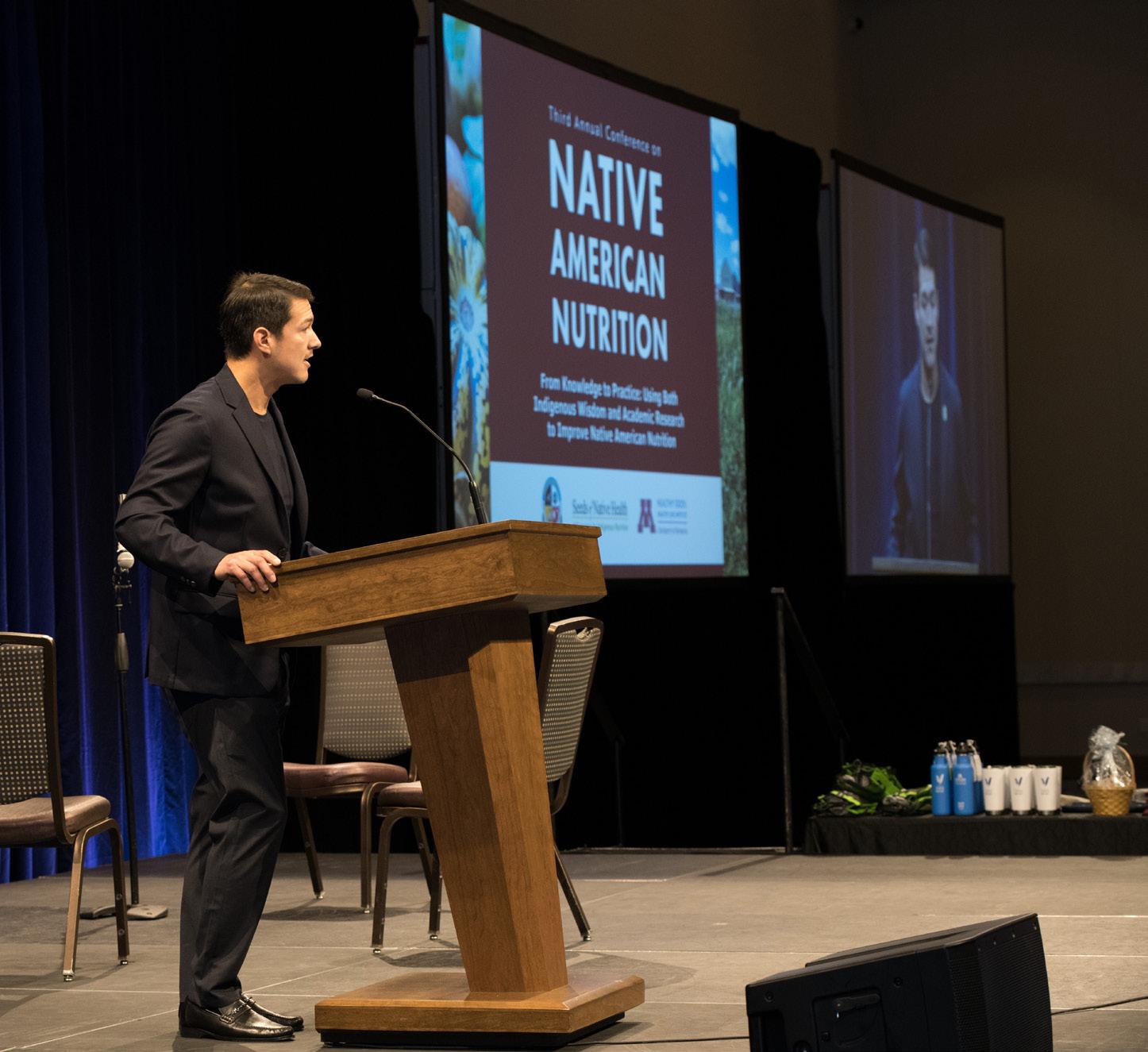




#SMSCGIVES AND COVID-19
Honoring the Dakota value of wóokiya (generosity and helping), the SMSC supports local communities from across the state and beyond, in a continued effort to embody Dakota values and share resources with others—now and for generations to come. To empower its employees to take part in this tradition of giving, the SMSC established the #SMSCgives community outreach program, an initiative that organizes volunteering opportunities in the local community. #SMSCgives allows the tribe and its employees to contribute in a meaningful way to the general well-being of the communities surrounding the SMSC, the charitable organizations and service providers in those communities, and the general public.
In both 2020 and 2021, years that posed hardships for many during the COVID-19 pandemic, #SMSCgives volunteers kept busy distributing food bowls and fresh produce during food distribution events, cleaning local parks, and distributing school supplies to local Native families.
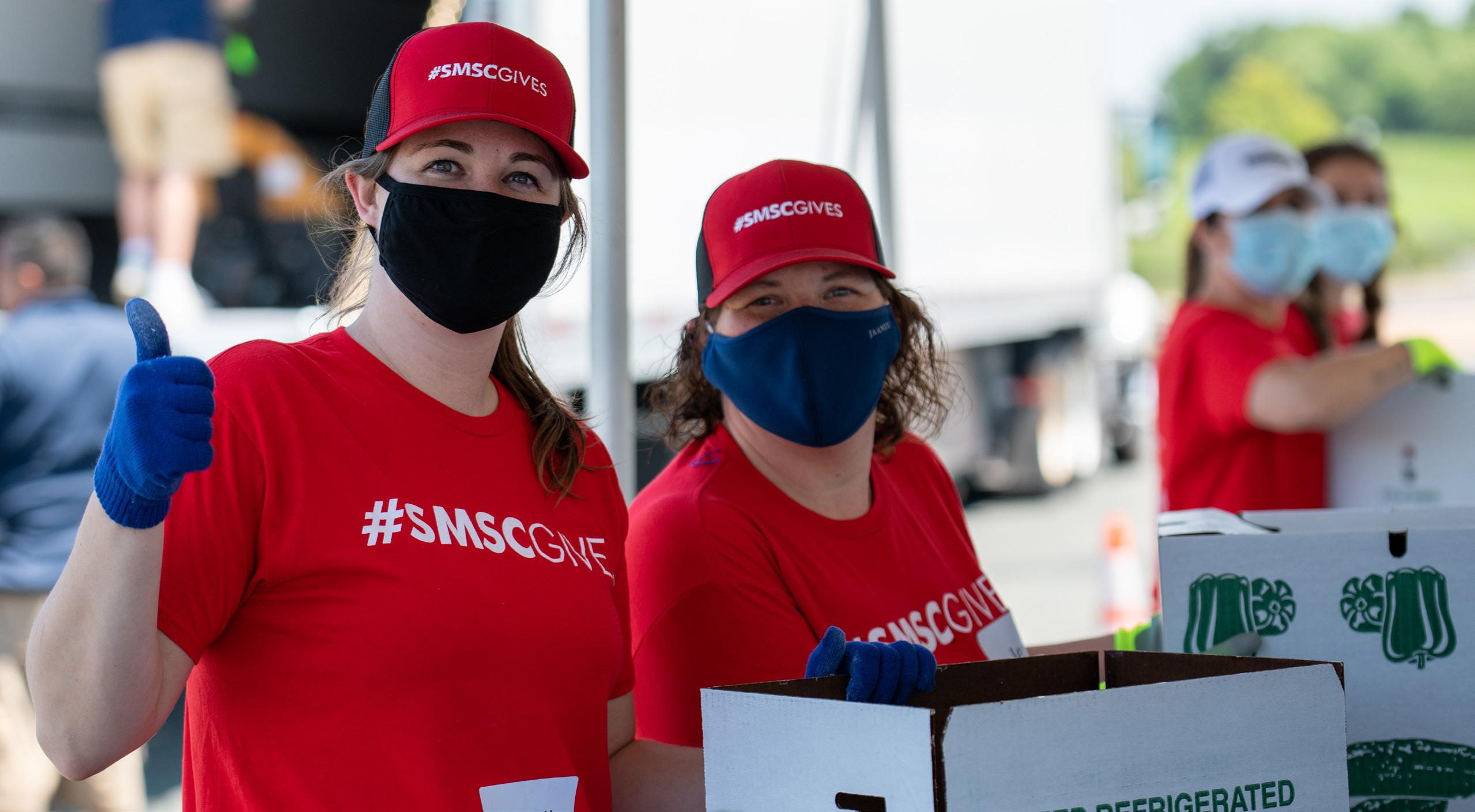
Toys for Tots, a nationwide organization run by the U.S. Marine Corps Reserve, has been delivering hope to children since 1947. The SMSC served as an official collection site for this year’s Toys for Tots program, which provides gifts to local families in need during the holiday season.
900 TOYS AND
$10 000
In conjunction with the $10,000 matching donation provided by the SMSC, the Community was able to provide upward of 900 toys and $10,631 to this worthy cause. With assistance from local social welfare agencies and church groups, the toys were distributed to families in the Twin Cities area.
Founded in 2012, Harvest Pack is a humanitarian hunger relief nonprofit that addresses food insecurity by coordinating meal packing events for volunteer groups. Harvest Pack’s healthy meals are then donated to established nonprofit partners who distribute them to food-insecure communities.
$6 000
In conjunction with the #SMSCgives program, the SMSC donated $6,000 and packed 27,520 meals in 2020, and 32,384 meals in 2021 for the Harvest Pack events. The Community Action Partnership (CAP) Agency helped distribute these meals to local communities in Scott, Carver, and Dakota counties.

Guided by the Dakota tradition of giving and the SMSC’s commitment to being a good neighbor, employer, and steward of the earth, the community outreach program was established as a collaborative, values-driven effort for employees to take action where help is needed and provide compassion, aid, and opportunities to our local community through acts of service—so that all may lead healthy and vibrant lives for generations to come.
In response to the COVID-19 pandemic in 2020, the SMSC partnered with the CAP Agency and Second Harvest Heartland to host several traveling farmers markets and food distribution events to provide free produce to local families in need throughout the year. Through these events, hundreds of thousands of pounds of fresh produce were distributed to more than 2,500 families.

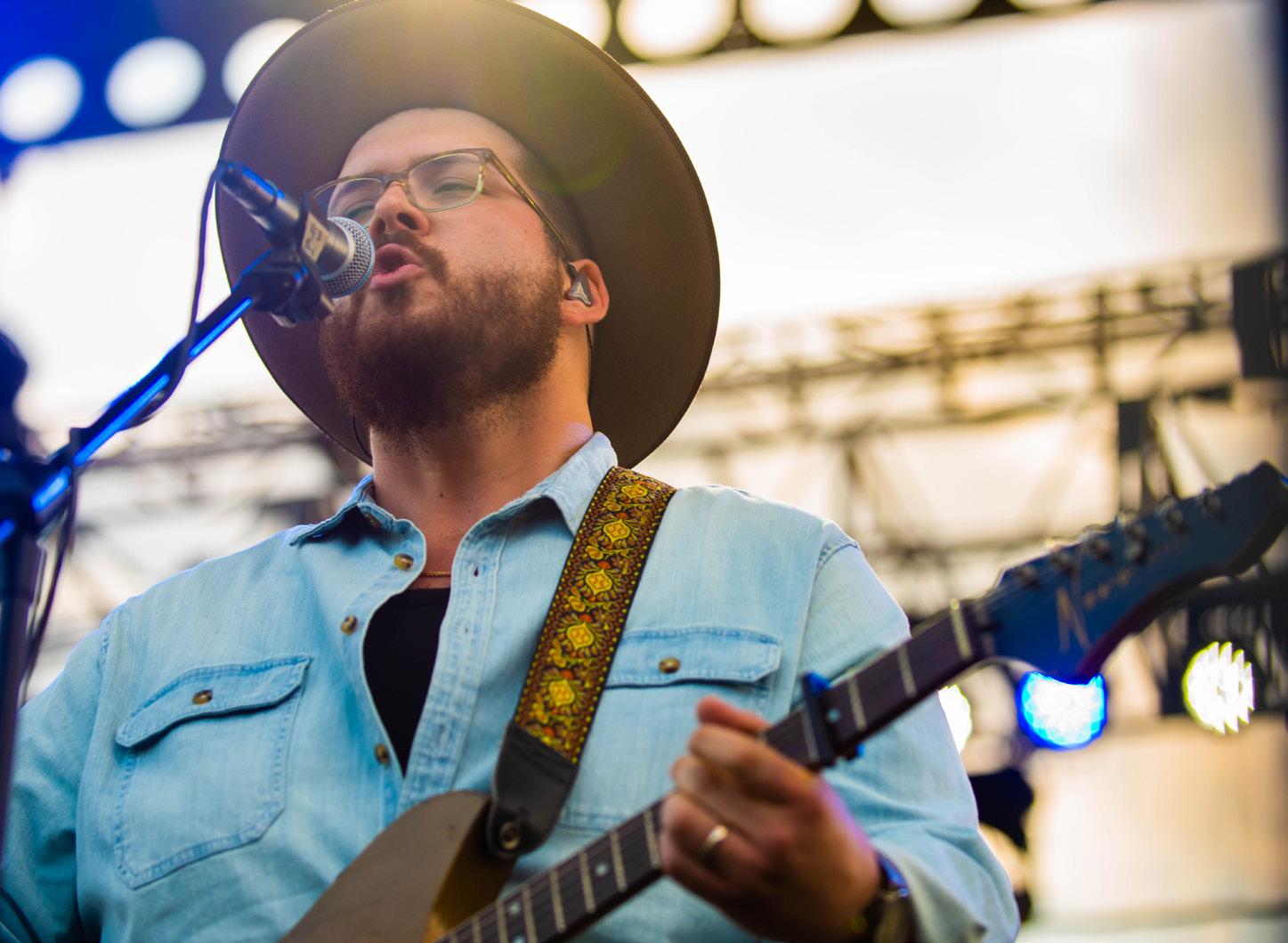
Rotarian members believe in putting “service above self”—this includes supporting local communities and developing strong, dependable partnerships.
The SMSC has been a partnering sponsor of the Prior Lake Rotary’s Lakefront Music Fest since its inception in 2010. In 2020, the two-day music festival was unfortunately postponed due to the pandemic, however, in 2021, the event had its most successful year ever with record-setting attendance. The event sold out—selling 17,000 concert tickets each night.
The SMSC donated a $50,000 cash contribution along with in-kind donations totaling an additional $50,000. The in-kind support included staffing the Public Safety Mobile Command Center and surveillance trailer during the event, working with Gaming Enterprise entertainment staff and talent, providing security guards for key positions including backstage and VIP, and the use of SMSC parking lots and directional signage. The SMSC also provided shuttle transportation, bicycle barricades, portable light towers, utility vehicles, post pounding equipment, and tents. The SMSC also donated 400 cases of bottled water for the event—a $2,000 value.
$100 000
Speaking on behalf of the SMSC—the event’s largest sponsor— Chairman Keith Anderson greeted a sea of people before the final act each night. “Thank you to all of the volunteers, Rotary members, our tribal employees, and all those in attendance— without you, Lakefront Music Fest wouldn’t be possible,” said Chairman Anderson. “And I’d especially like to thank our members who provide the support needed to put on this event every year.”
The music festival is the Rotary club’s largest yearly fundraiser that helps support several projects including PolioPlus, Rotary International’s initiative to end polio.
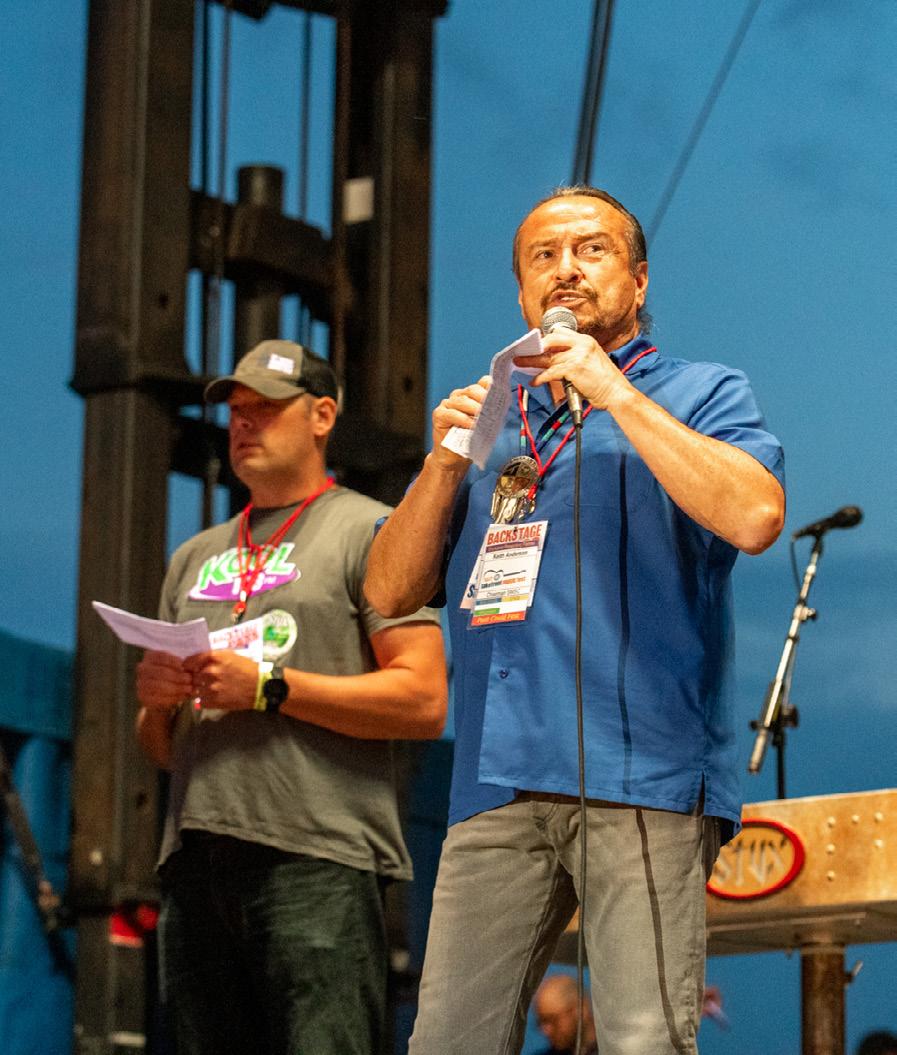
Rotary is a global network of 1.4 million neighbors, friends, leaders, and problem-solvers who unite and take action to create lasting change—across the world and in local communities.
Making it a top priority to be a good neighbor, the SMSC has provided grants for several local trail and bridge projects. Since 2014, the tribe has given nearly $700,000 in grants to local cities and counties to fill trail gaps, augment existing trail systems, improve access to existing public natural areas, and provide additional environmental benefits.
After two years of planning and construction, the SMSC joined the city of Savage Mayor Janet Williams and other local officials for a ceremonial ribbon-cutting for the new pedestrian bridge in Hidden Valley Park in October 2020. The newly constructed bridge replaces an old wooden bridge on the north side of the park. The SMSC provided $100,000 for the project.
“The city of Savage sincerely appreciates this generous donation to our community by the SMSC,” said Mayor Williams. “We also appreciate our partnership which has always focused on the environment and is important to both of us.”
Several other improvements are slated for Hidden Valley Park, such as the construction of a new shelter, new tables and grills, electrical and water hookups for the shelters, a drinking fountain, landscaping, and an expanded parking lot. In addition to replacing two of the pedestrian bridges over the Credit River, the city will also remove the park’s northernmost pedestrian bridge and stabilize the riverbank in that area.
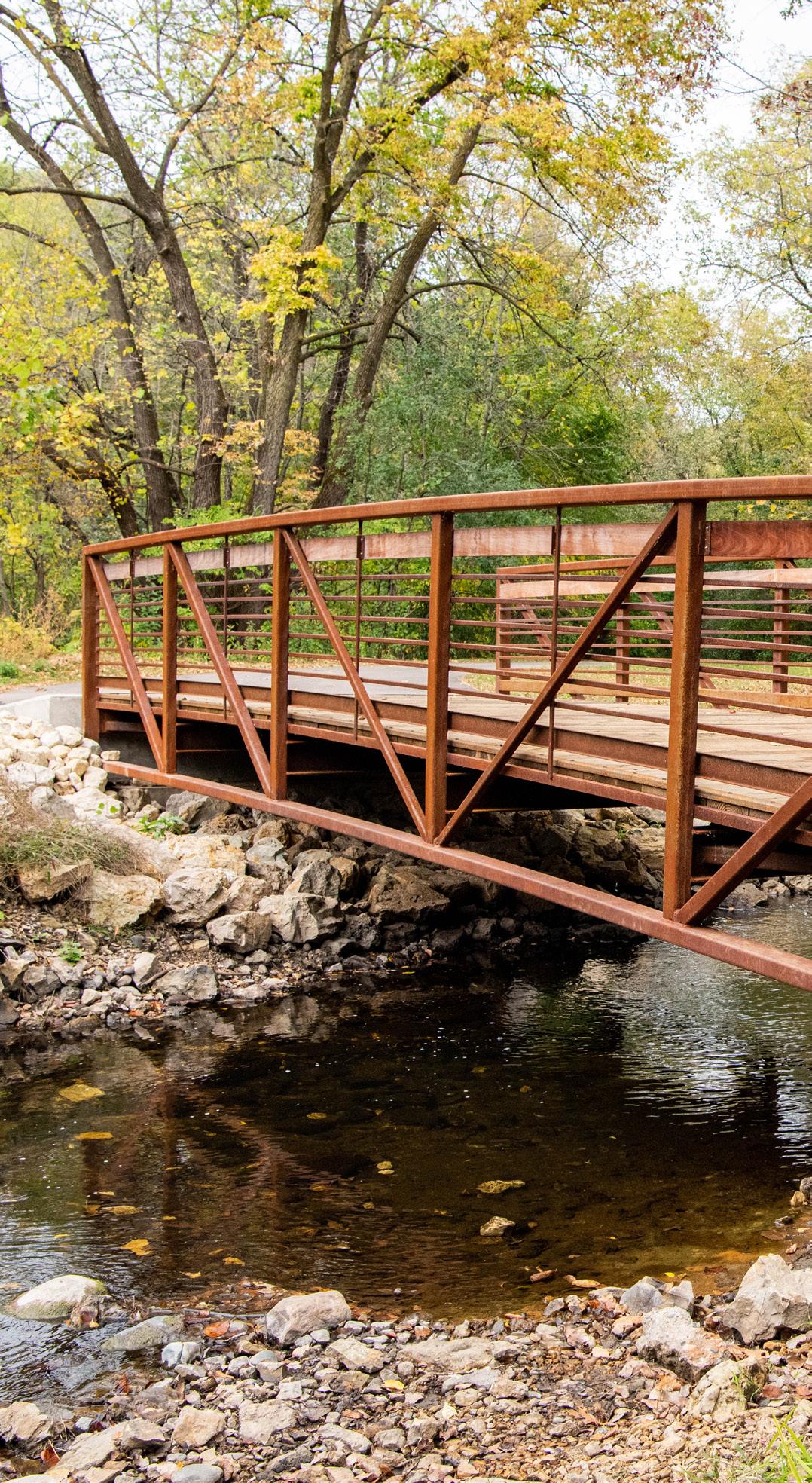
In July 2020, the SMSC, Xcel Energy, city of Shakopee, and Shakopee School District broke ground on a new mountain bike park located at Xcel Energy’s Blue Lake power plant and Quarry Lake Park in Shakopee, Minnesota. The new trail officially opened for fat tire bike use in December 2020.
The SMSC gave a $14,510 grant to the Shakopee School District for the construction of the trail. The trail is part of a greater Quarry Lake Park development plan, which includes a new mountain bike course, a picnic area with a shelter, a play area, and improvements to the water ski club area. The park will be open to the public year-round and used by the Shakopee Mountain Bike Team as well as the general public.
The course builds on the city’s vision of Quarry Lake Park as a recreation destination for outdoor enthusiasts in the hidden gem of a park. The mountain bike trail weaves through a neighboring property owned by Xcel Energy, creating more than four miles of trails that go around Quarry Lake with riding options for those just beginning mountain biking to advanced riders. The design and location of the trail also supports future plans to use the course for National Interscholastic Cycling Association racing.
“These mountain bike trails will be a great new recreational offering, helping us get exercise and explore nature,” said SMSC Chairman Keith Anderson. “The park will benefit the region, and our tribe is glad to have a role in making it happen.”
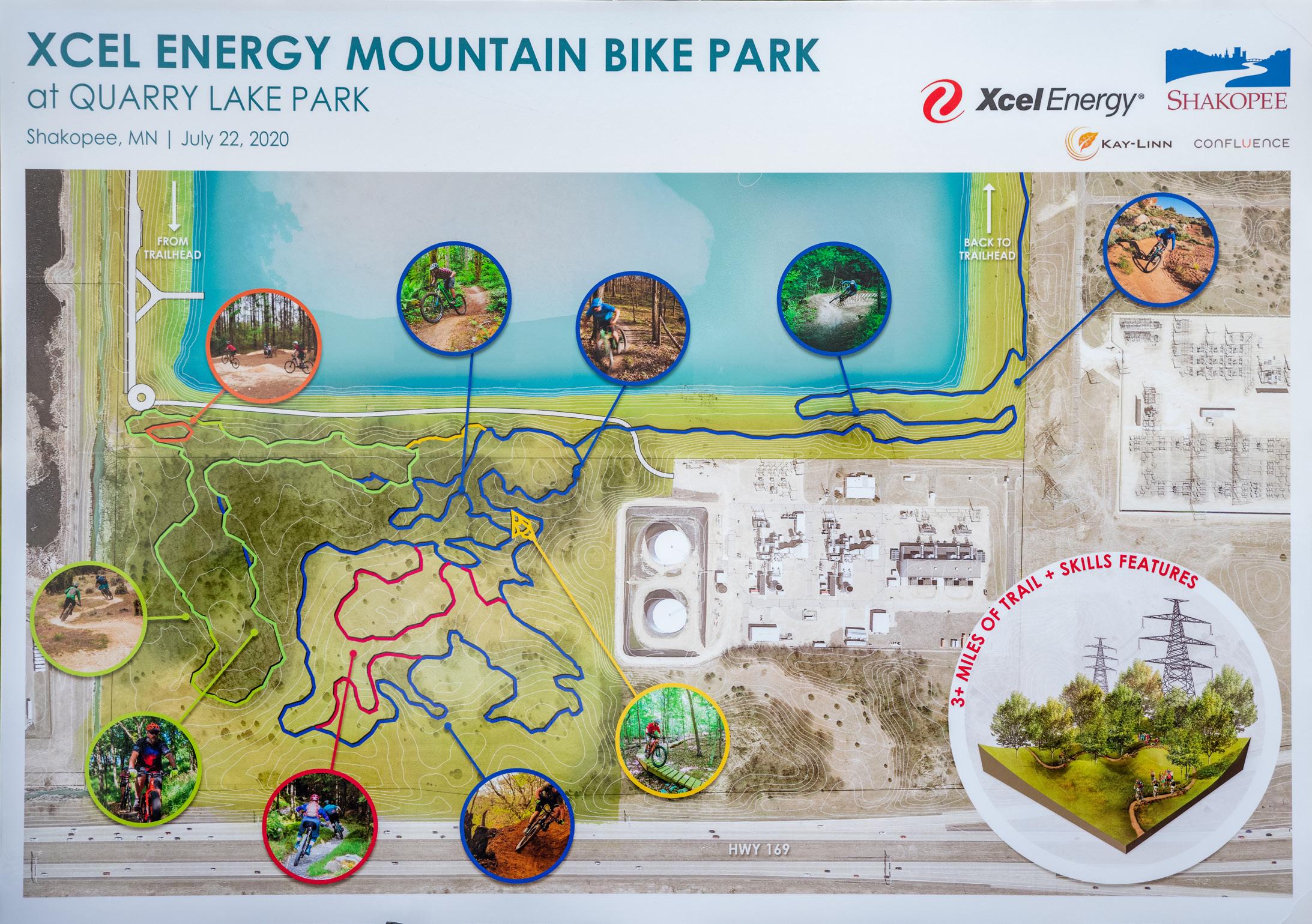
Participation in youth sports can lead to immediate and long-term benefits for youth, their families, and communities. No matter the sport, participation is believed to improve physical and emotional health, discipline, and education, and cultivate teamwork and leadership skills.
$15000
In fiscal years 2020-22, the SMSC provided thousands of dollars in financial support across a variety of local youth sports organizations that serve to promote and provide administrative financial support for their sports programs, giving youth the opportunity to achieve success.
Those organizations include Play Prior Lake Baseball, Prior Lake Savage Area Schools Golf, Prior Lake Savage Hockey Association, Shakopee Cross Country Booster Club, Shakopee High School Volleyball Booster Club, Shakopee High School Wrestling Booster Club, Shakopee Mat Club, Shakopee Prior Lake Water Ski Association, Shakopee Varsity Baseball Booster Club, and the Shakopee Youth Lacrosse Association.
The Mini Met Ballpark, located in Jordan, Minnesota, has been around since 1994. Maintaining and enhancing the historic smalltown Little League baseball field as well as bringing volunteers together to ensure that the facility remains a staple in the local community has remained a priority for the city. The board of directors helps organize, host, and administer multiple state tournaments at the ballpark for youth and amateurs. Since its creation, the Mini Met Ballpark has provided a great player and fan experience and is home to the Minnesota State High School League’s State Tournament, as well as local youth and high school baseball teams. The facility hosts multiple youth camps during the summer and several appreciation events throughout the season for traveling youth baseball teams and families.
$20000
Maintaining the small-town historic structure requires constant attention and hundreds of annual volunteer hours. In 2012, the SMSC donated $150,000 toward the ballpark capital improvement project. In 2022, the Mini Met Ballpark sought funds for maintenance upgrades to the facility, to which the SMSC responded with a $20,000 donation for an LED lighting upgrade. This lighting improvement is essential to the ballpark and the new technology will be enjoyed by players and fans for many years to come.
Since 1857, the Scott County Agricultural Society has brought people together for summertime fun with its annual fair. The SMSC continued its longtime sponsorship of the Scott County Fair by donating $30,000 across the 2021 and 2022 get-togethers. The donations were used in part to host family-friendly entertainment, including the Abracadabra Magic Show, the Farmer Bob roaming tractor entertainer, and a lumberjack show. Funds also went to providing passenger golf carts for fairgoers and the Remember Our Fallen memorial, which recognizes those who lost their lives while serving in Iraq and Afghanistan.

$30000
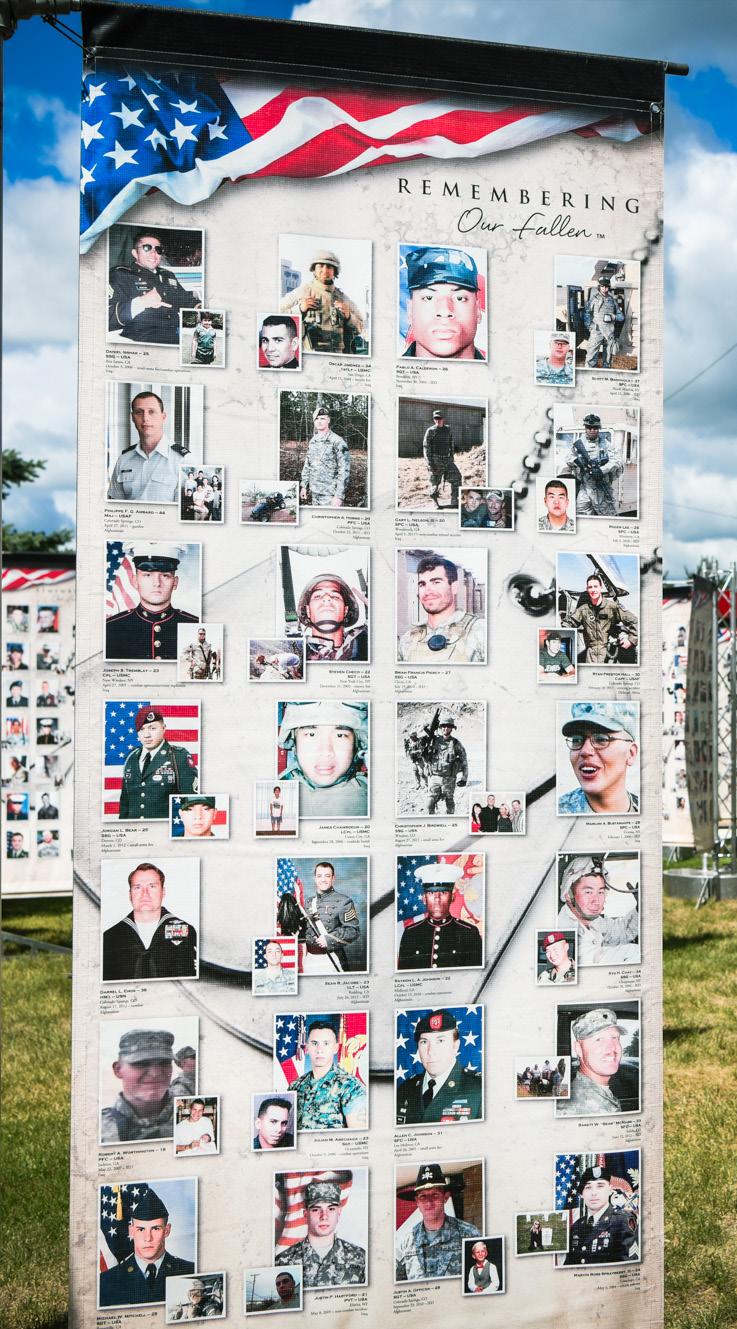
In an effort to both connect people of all backgrounds with nature and to give back to our bison relatives, the SMSC granted the Minnesota Zoo Foundation $1,500,000 to help fund the Step Into Nature Campaign and the bison program.
$1500000
The Step Into Nature Campaign sets out to construct and maintain the new Treetop Trail, which will follow the same route as the zoo’s former monorail system once did, upon opening in summer 2023. Representatives from the SMSC including Secretary/Treasurer Rebecca Crooks-Stratton attended the trail’s groundbreaking ceremony in May 2022 to help unveil the final plan to the public and share praise of the project.
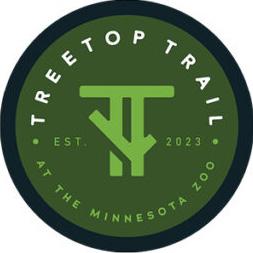

At 1.25 miles in length and 32 feet above ground, the trail is on track to be the world’s longest elevated pedestrian loop. Winding through tree canopy and overlooking animal
exhibits that belong to bison, camels, tigers, moose, and more, the Treetop Trail will give zoo guests access to nature like they have never had before. The trail is designed to accommodate guests of all ages and abilities and will be accessible in all seasons. And with opportunities for recreational and cultural programming throughout the year, the Treetop Trail will serve as a multi-purpose space for a number of activities, such as 5K races, concert series, yoga sessions, art programming, snowshoeing, and more.
In addition to the Step Into Nature Campaign, the SMSC also contributed to the zoo’s ongoing bison program that will care for and protect the herd of bison at the Minnesota Zoo and in the Minnesota bison conservation herd. It is also a goal of the program to release yearling bison into Minnesota state parks sometime in the future.
Between the two campaigns, the SMSC hopes to see people become closer with nature and to be inspired to give back to Ina Mak̇a (Mother Earth).

WÓOKIYA
GENEROSITY & HELPING WÓWICAKA
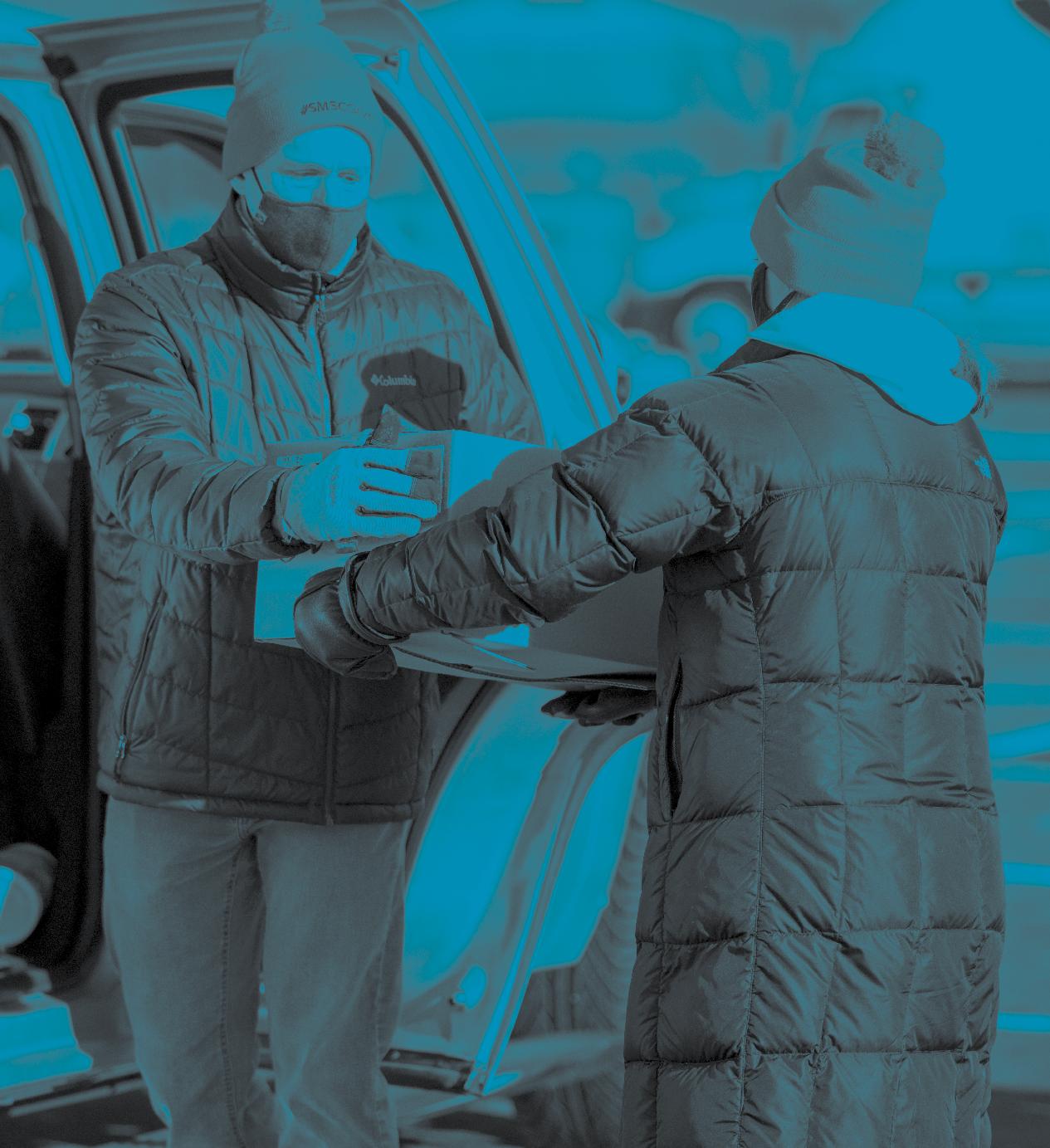
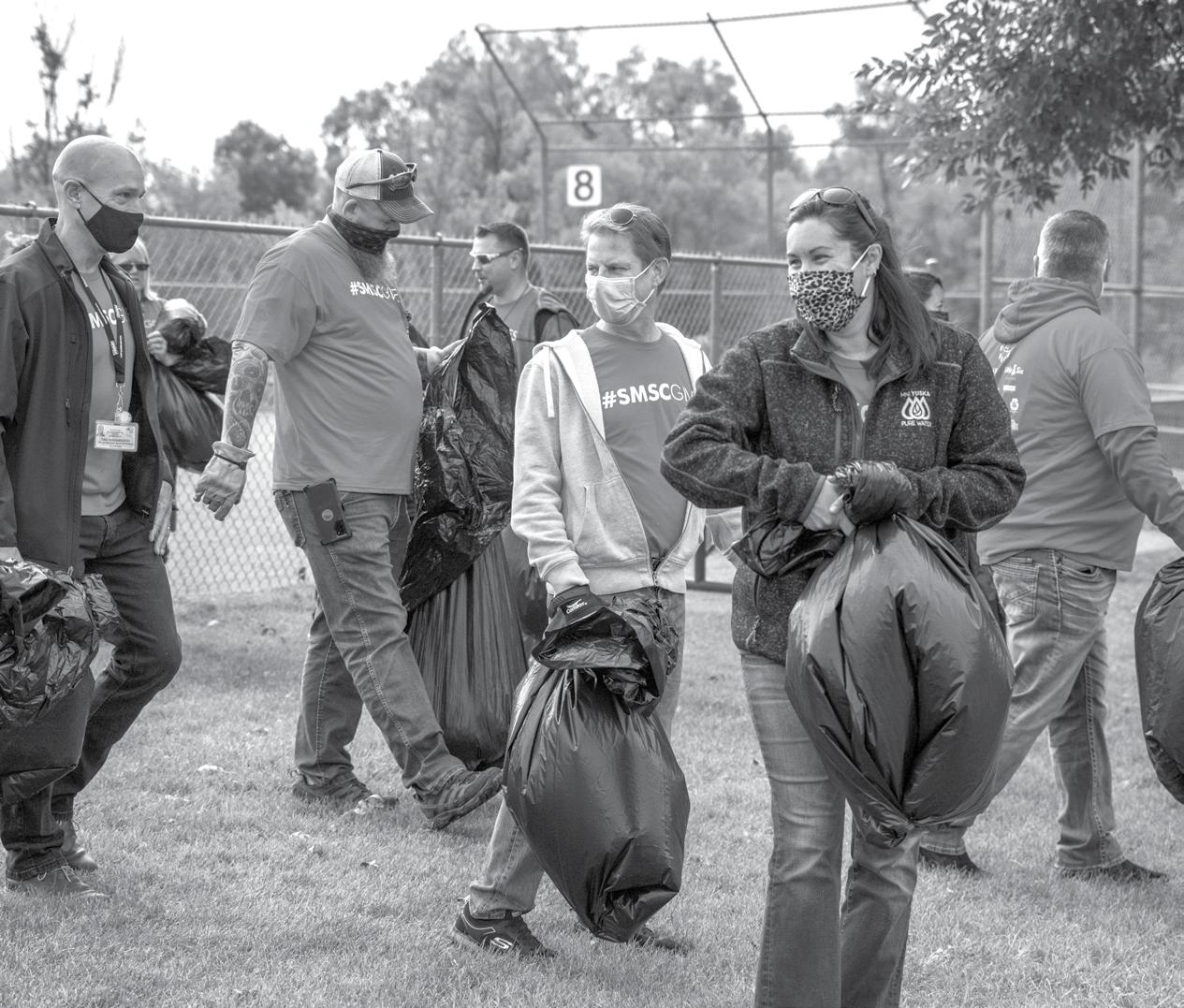
HONESTY & TRUTH WÓKSAPE
WISDOM WÓOHODA
CARING & COMPASSION
